Items
Subject is exactly
Social Issues
-
2020-07-01
The hidden costs of the pandemic
Covid-19 was a surprising event that has shaken how many view the world. I am here now retelling my story on behalf of HNSC 2100, Fall 2020, M. Horlyck-Romanovsky. The pandemic has brought the worst in many. People were selfish, people took advantage of those who were desperate, and there were countless fights for small things in stores when it wasn't a big necessity. It brought me to think that humanity is really that selfish. But in a turn of things, it also brought together many people. Those who cared for one another were always there to talk to, sharing what they could and giving helpful advice to handle this pandemic. This leads me to my family and friends. When it first began, I was scared and felt all alone. My friends were the first ones I'd contact and first hear from. Worry washed over me when I realized there were certain friends I rarely talked to, making me want to go through who I had contact with and those I didn't. Time felt short and precious as you see many people's lives ending too soon because of this virus. In a sense, it made me value life more. While this opened my eyes to one side of life, it also opened my views to another part of life. When there is a more significant issue, those in power still refuse to do what is for the greater good, but instead for profits. What could have been a perfect time to provide resources and funds to marginalized and those in poverty communities they desperately need to prepare for a foreseeable shutdown? Instead, nothing was done for a while, and jobs were taken away to keep everyone at home. There was money to use, especially in bigger businesses and the Government, but it needed to be seen as profitable. What was worse about this was that I actually worried that the Government wouldn't have money in general, but looking into how more prominent corporations asked for millions, if not billions, in compensation for lost revenue, which they did receive in the end, made me extremely upset at the priorities of where our society is. Not only first losing faith in humanity but also in our own governmental structures. I wanted to grow up to work at these more prominent corporations due to their fame and how they represent themselves. But seeing this and the lack of giving back for the greater good, I have lost interest in even being associated with these types of corporations. One big thing that did come from all this chaos was the need to advocate for the smaller groups of people who can't or are afraid to speak up. I now want to work in a place where we can easily provide feedback/assistance to communities that are being impacted but not cared for. I take inspiration from my friends who have been there by my side, taking time when they could and always showing their support. Without them, I couldn't have gone through the pandemic with my sanity intact. While on the topic of sanity, the ways that the cost of living and prices of food went up at such a dire time of need were the most insane part of this pandemic. No one can afford food; it is clear no one is willing to spend on higher quality foods, and it's going to waste, so in turn, the prices would go down, right? No. The entire industry would rather destroy their own crops than give them away at dirt-cheap prices when it would have benefited everyone. Getting rid of the excess waste while making some money for selling it cheaply and the people can actually eat healthily as the prices plummet due to an abundance of this resource. Being a good defense against the virus if your immune system is at its peak! It infuriates me that this did not occur. My family struggled to make ends meet and put food on the table. It was the first time I had to reach out to food pantries, and I saw such long lines. It was a saddening sight to see. Every day, week, month, you'd see a line. Just how many really needed help, but no one could provide it. And when help did arrive, it was a measly couple hundred dollars or close to a thousand after half a year of suffering. If only food prices would have gone down as the entire world was going down, too, that would have been a blessing in itself. Even today, it is hard not to find myself using a food pantry. I wish I wasn't and didn't require these services, but it has become a regular occurrence ever since the pandemic. Now that it has quieted down while still occurring around the states and the world, the virus has taught us one thing. We must be ready to fend for ourselves; it is a sad truth, but it has become an untrustable and helpful place for the Government. I hoped we could move toward a better future, but this wasn't true. But that is what I took from this, and I plan to do work to combat and help others. The one good thing I see that came from this is my experience. -
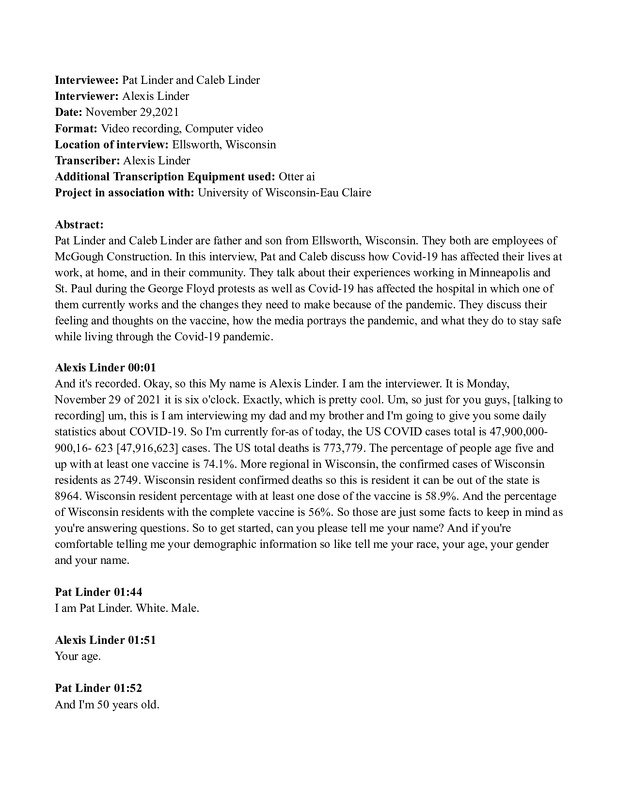 2021-11-29
2021-11-29Pat and Caleb Linder Oral History, 2021/11/29
Pat Linder and Caleb Linder are father and son from Ellsworth, Wisconsin. They both are employees of McGough Construction. In this interview, Pat and Caleb discuss how Covid-19 has affected their lives at work, at home, and in their community. They talk about their experiences working in Minneapolis and St. Paul during the George Floyd protests as well as Covid-19 has affected the hospital in which one of them currently works and the changes they need to make because of the pandemic. They discuss their feeling and thoughts on the vaccine, how the media portrays the pandemic, and what they do to stay safe while living through the Covid-19 pandemic. -
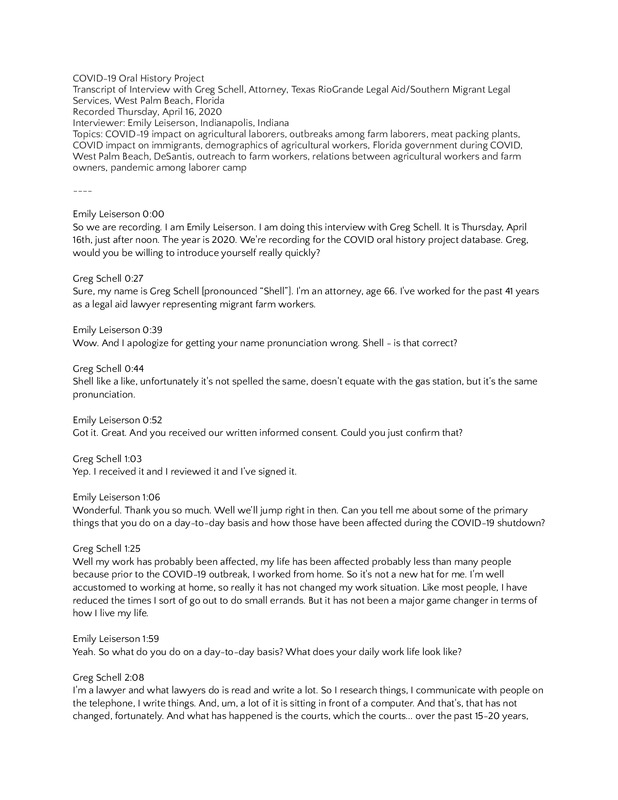 04/16/2020
04/16/2020Greg Schell Oral History, 2020/04/16
-
 2023-05-16
2023-05-16News Article Analysis: India Is What Happens When Rich People Do Nothing
I will analyze this article focusing on the devastating impacts of the Covid-19 pandemic, including exploitation of marginalized groups like migrant workers, oxygen and other medical resource shortages, and the overall structural consequences of poor governance and health infrastructures in India. Not only does the writer Krishnan cater to the failures of the current Indian federal government during the pandemic, but he aims to point out the great moral failure of our whole generation, which has exposed the long-existing structural issues in providing for public healthcare and social security of Indian citizens. -
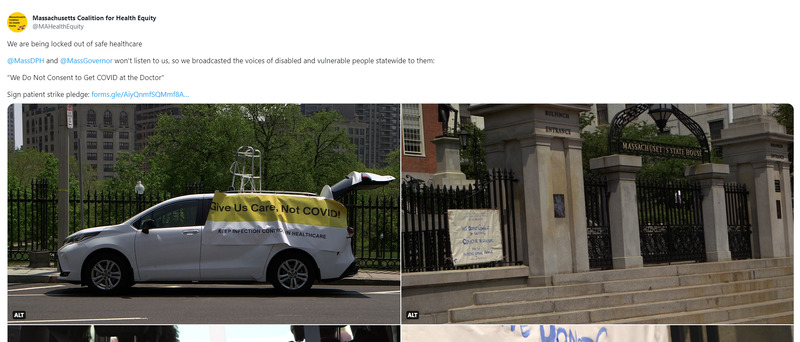 2023-05-14
2023-05-14Pandemics are Not "Great Equalizers" - Comparing COVID-19 to the Bubonic Plague Outbreak of 1870-1905
With the designation of COVID-19 as a "public health emergency" by the Centers for Disease Control and Prevention (CDC) ending as of May 11, 2023, public healthcare facilities throughout the US are rolling back protections they once employed to try to keep people safer during this ongoing pandemic. So, as this unit asks of us students, are pandemics the “great equalizers” in terms of social inequalities, and is there more equality now that the "emergency" has been deemed to be over? I argue that this is not the case, as immune compromised and disabled people have been more or less left for dead. A huge swath of healthcare facilities have removed mask mandates for care providers and hospital visitors, which leaves vulnerable and immune compromised people at a much higher risk of getting COVID-19 while receiving the medical care that is necessary for them to manage their conditions. In response, people and organizations, such as the Massachusetts Coalition for Health Equity in the tweet above, have begun to mobilize in favor of maintaining COVID-19 protections in healthcare settings by organizing strikes, protests, petitions, and phone banks to public officials. The reasons for maintaining COVID precuations such as mask mandates, access to COVID tests, and enhanced filtration in healthcare settings are clear. As the Massachusetts Coalition for Health Equity describes in their petition titled "Patient Strike Authorization Vote," the CDC "advises immunocompromised people to avoid crowded indoor settings, which now includes all healthcare institutions without universal masking," essentially maintaining that COVID is dangerous to immune compromised people while giving them no option but to risk exposure if they want to receive their necessary healthcare (Patient Strike Authorization Vote). The petition text explains that "[n]ational leaders in hospital epidemiology argue that universal masking should become the new standard of care, as gloves became with HIV" in order to keep people with compromised immune systems such as young children and elders safe (Patient Strike Authorization Vote). Currently, disabled and immune compromised people "are being locked out of safe healthcare" and are facing discrimination that makes them unwelcome and unsafe in healthcare settings (Massachusetts Coalition for Health Equity). In order to relate this modern COVID-19 pandemic to our course materials and demonstrate that discriminatory treatment during times of disease is not new, I will compare the above post to points from the text "The Chinese as Medical Scapegoats In San Francisco, 1870-1905" by Joan B. Trauner. This text discusses the discrimination against Chinese and other East Asian people living in San Francisco's Chinatown during a bubonic plague outbreak in the late nineteenth century. Sinophobic and anti-Asian sentiments, similar to those that arose during the epidemic Trauner details, have also been evident throughout the COVID-19 pandemic, so much so that even US President Donald Trump referred to COVID-19 as the "China virus." Ableism has also been prevalent throughout the COVID pandemic, as many people no longer care about the effects of the virus, because it harms disabled and immune compromised people most, especially people who also face racial discrimination in healthcare. Trauner explains that, because white people in the US believed the plague primarily affected Chinese and other Asian people, and because plagues were bad for business,"[t]he governor of California, Henry T. Gage, and executives of big business and of the large railroads, in conjunction with the San Francisco Board of Trade, the San Francisco Chamber of Commerce, and the Merchants Association, were all determined to prove that the plague did not exist in San Francisco" (78). The author of the Patient Strike Authorization Vote argues that today, we see a similar pro-business sentiment that comes at the expense of immune compromised people who are more likely to get sick with and die from COVID-19, writing: "Hospitals that remove masks and surveillance testing are making a value judgement about our lives, because they want to preserve their profit margins" (Patient Strike Authorization Vote). The CDC's ending of the COVID-19 public health emergency designation and the resulting halt of COVID mitigation procedures indicate that people are ignoring the needs of immune compromised people so that everyone can feel more comfortable going "back to normal" and maintaining consumption habits that are desired by businesses. Additionally, in both the past plague outbreak and the current pandemic, public health officials have shown hesitancy to give people vital information, which has led to harm. As Trauner explains, during the bubonic plague epidemic, "San Francisco Mayor Eugene Schmitz refused to approve the printing of health reports and vital statistics and even attempted to remove from office four members of the Board of Health who persisted in stating that plague existed in San Francisco" (79). Today, because the public health emergency designation ended on May 11th, 2023, the CDC is "no longer reporting aggregate cases and deaths, COVID-19 Community Levels, COVID-19 Community Transmission Levels, or COVID-19 Electronic Laboratory Reporting (CELR) data," all of which have been used to determine the severity of the situation throughout the pandemic (COVID Data Tracker). Meanwhile, over one thousand people are dying of COVID every single week, but COVID transmission levels are not being tracked, so people cannot know how many COVID positive cases there are in their county and how likely they are to contract the virus by going out in public (COVID Data Tracker). Another similarity between the COVID-19 pandemic and the bubonic plague outbreak of the late nineteenth century lies in the responses of the people facing discriminatory treatment in public health settings during these respective disease outbreaks. Trauner writes that before, during, and after the bubonic plague outbreak, Chinese businesses and health practitioners constructed and operated their own hospitals that would treat the people of Chinatown, because they were not welcome at other hospitals due to racial discrimination (81). Trauner explains that "[e]arly Chinese immigrants realized the necessity of banding together and providing for their own health care needs," in light of the government abandoning their health needs (81). Activists and organizations like the Massachusetts Coalition for Health Equity are currently banding together and fighting to get better and safer care for immune compromised people during the COVID-19 outbreak, as they are also facing discrimination at hospitals rolling back COVID precautions, because these spaces are not safe for them. The organizing they are doing to try to make healthcare settings safer for immune compromised people looks different, as no one is proposing the creation of immunocompromised-specific hospitals. They are fighting for better treatment, still, using slogans like "We Do Not Consent to Get COVID at the Doctor," and urging people that "[w]e must take collective action to prevent this mass violation of our human rights and federal rights to safe care," as stipulated under the Americans with Disabilities Act (Massachusetts Coalition for Health Equity). In both disease outbreaks, it has been the duty of those being discriminated against to take care of and advocate for themselves. So, in fact, pandemics are not "great equalizers"; in reality, they not only make pre-existing inequities even more visible, but exacerbate them even further. As Trauner argues, "Health policy [...] manifests not only the state of the medical sciences, but the expectations and the value system of society-at-large," and as such, if society-at-large is racist and ableist, then the health policies put into place will reflect these discriminatory values (70). These governmental measures come at a cost to everyone, and especially those facing racist and ableist discrimination. Had the nineteenth-century bubonic plague outbreak been determined an emergency and treated as a serious threat in spite of sinophobic and anti-Asian sentiments, perhaps more research could have been carried out sooner, and more lives could have been saved. If people in the US continue to take the COVID-19 pandemic seriously and not dismiss the pleas of immune compromised and disabled people to continue precautions, perhaps loss of life and further disablement from COVID infection can be mitigated. -
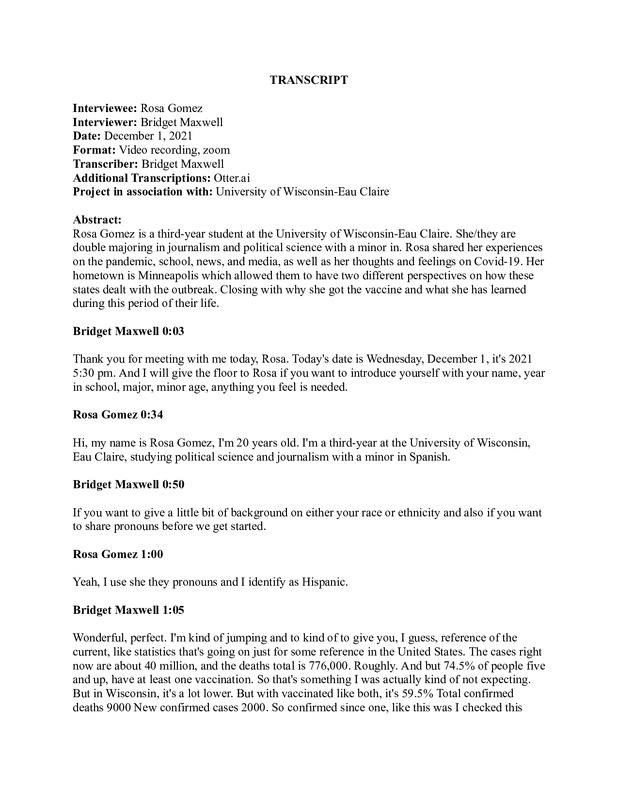 12/01/2021
12/01/2021Rosa Gomez Oral History, 2021/12/01
Rosa Gomez is a third-year student at the University of Wisconsin-Eau Claire. She/they are double majoring in journalism and political science with a minor in. Rosa shared her experiences on the pandemic, school, news, and media, as well as her thoughts and feelings on Covid-19. Her hometown is Minneapolis which allowed them to have two different perspectives on how these states dealt with the outbreak. Closing with why she got the vaccine and what she has learned during this period of their life. -
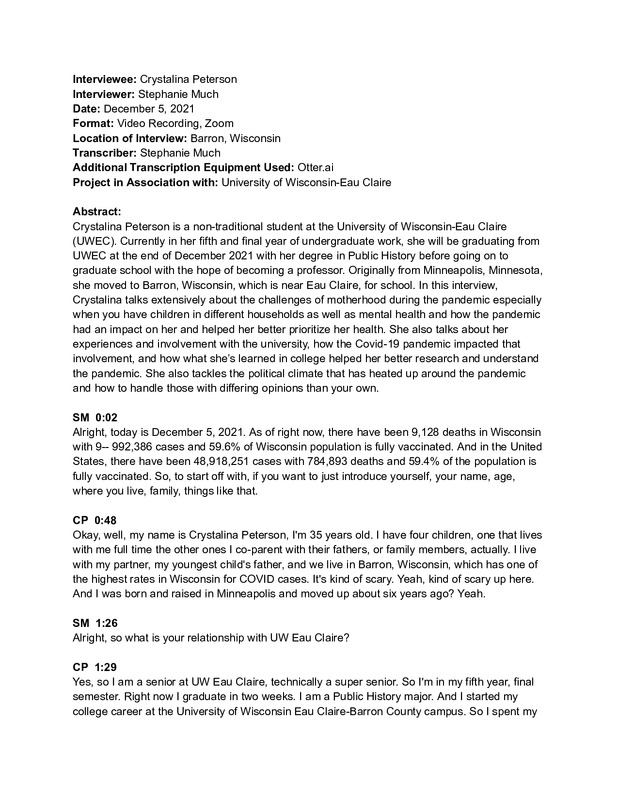 12/05/2021
12/05/2021Crystalina Peterson Oral History, 2021/12/05
Crystalina Peterson is a non-traditional University of Wisconsin-Eau Claire (UWEC) student. Currently, in her fifth and final year of undergraduate work, she will graduate from UWEC at the end of December 2021 with her degree in Public History before going on to graduate school with the hope of becoming a professor. Originally from Minneapolis, Minnesota, she moved to Barron, Wisconsin, near Eau Claire, for school. In this interview, Crystalina talks extensively about the challenges of motherhood during the pandemic especially when you have children in different households as well as mental health and how the pandemic had an impact on her and helped her better prioritize her health. She also talks about her experiences and involvement with the university, how the Covid-19 pandemic impacted that involvement, and how what she’s learned in college helped her better research and understand the pandemic. She also tackles the political climate that has heated up around the pandemic and how to handle those with differing opinions than your own. -
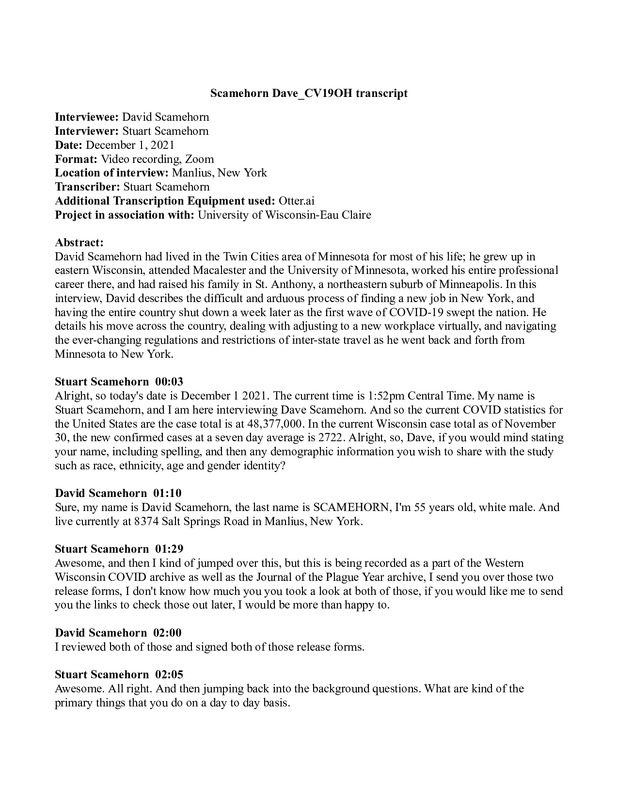 12/01/2021
12/01/2021David Scamehorn Oral History, 2021/12/01
David Scamehorn had lived in the Twin Cities area of Minnesota for most of his life; he grew up in eastern Wisconsin, attended Macalester and the University of Minnesota, worked his entire professional career there, and had raised his family in St. Anthony, a northeastern suburb of Minneapolis. In this interview, David describes the difficult and arduous process of finding a new job in New York, and having the entire country shut down a week later as the first wave of COVID-19 swept the nation. He details his move across the country, dealing with adjusting to a new workplace virtually, and navigating the ever-changing regulations and restrictions of inter-state travel as he went back and forth from Minnesota to New York. -
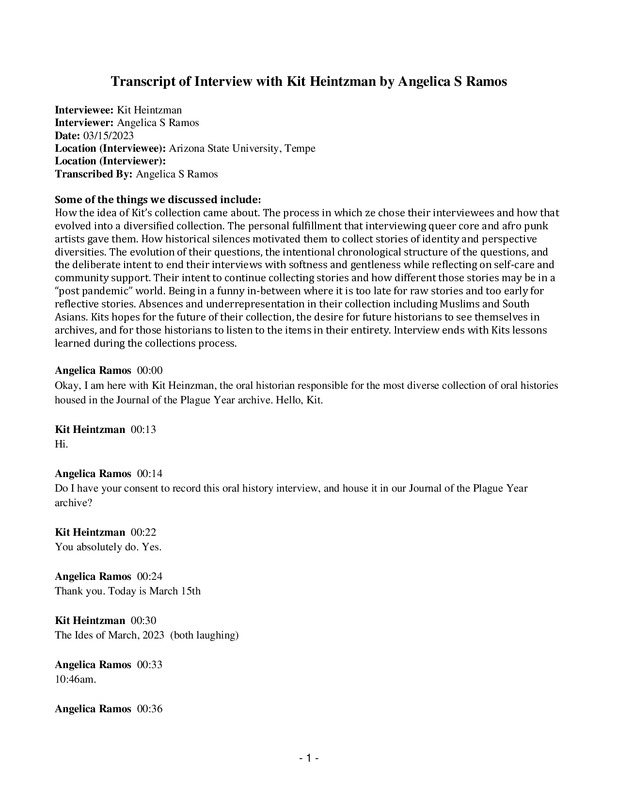 2023-03-15
2023-03-15Kit Heintzman Oral History, 2023/03/15
Kit Heintzman is a recovering academic currently residing in Lenapehoking, who was trained in the medical humanities with a special interest in queer theory, animals, and the history of nationalism. Kit has developed a singular collection of oral histories of the pandemic for A Journal of the Plague Year, collected from a range of individuals with widely diverse experiences. That collection addresses significant silences surrounding the pandemic broadly and within JOTPY more narrowly. In this item Kit is interviewed by Angelica and Erin, both with Arizona State University, about Kits collection process. -
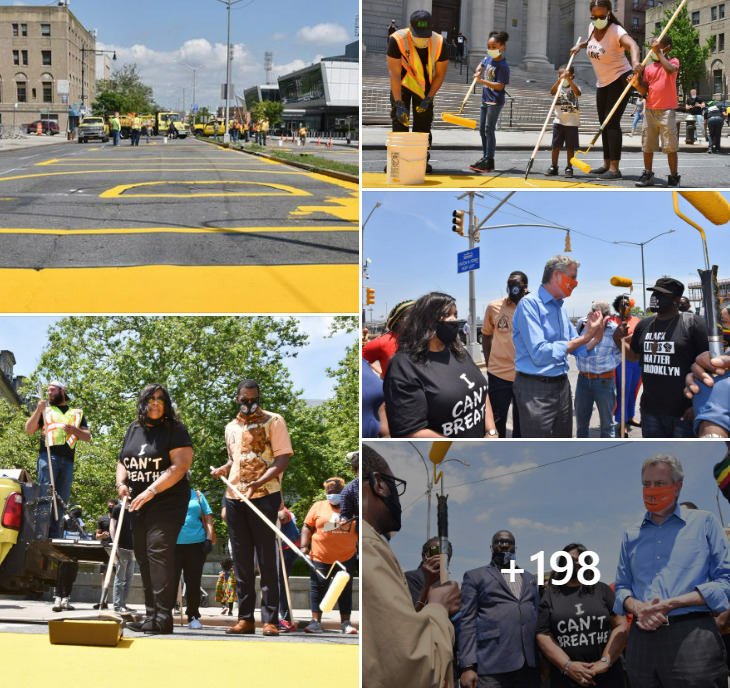 September 2, 2020
September 2, 2020BLM
BLM -
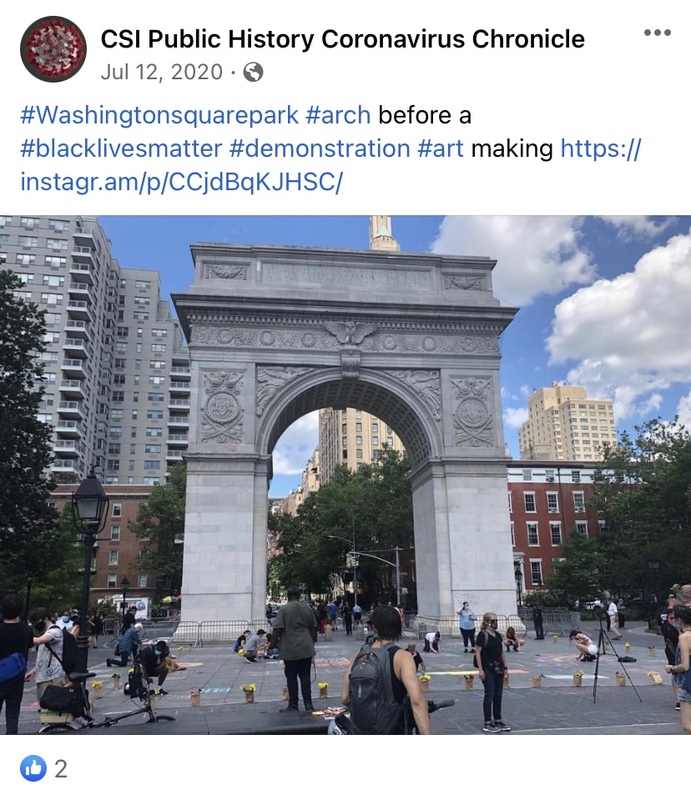 July 12, 2020
July 12, 2020Arch of Washington Square park during BLM demonstration
Screenshot of washington Square park arch before a BLM demonstration from the CSI Public History Coronavirus Chronicle Facebook page -
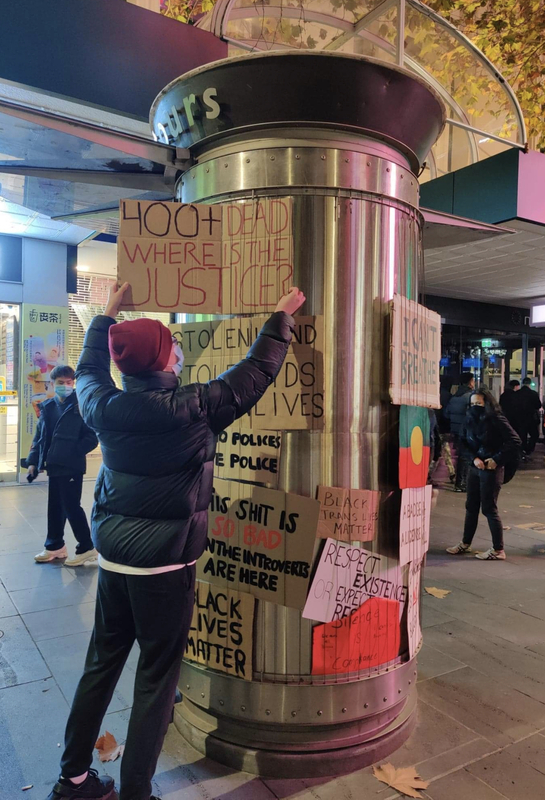 2020-06-06
2020-06-06History within History
HIST30060: This photo was taken at the Melbourne Black Lives Matter protest in June of 2020, it was one amongst the wave of protests taking place across the world sparked by protests in the United States following George Floyd's death at the hands of the police. It was the second protest I had attended and the sheer number of people attending to show solidarity with people of colour in the US and shed light on police issues at home was an inspiring sight despite the harrowing reality of it all. Figures such as the Prime Minister at the time cited health risks as reason to not demonstrate, but this potential of COVID spreading however was consistently weaponised by conservative pundits (despite their consistent calls for lax restrictions). to discredit the movement. -
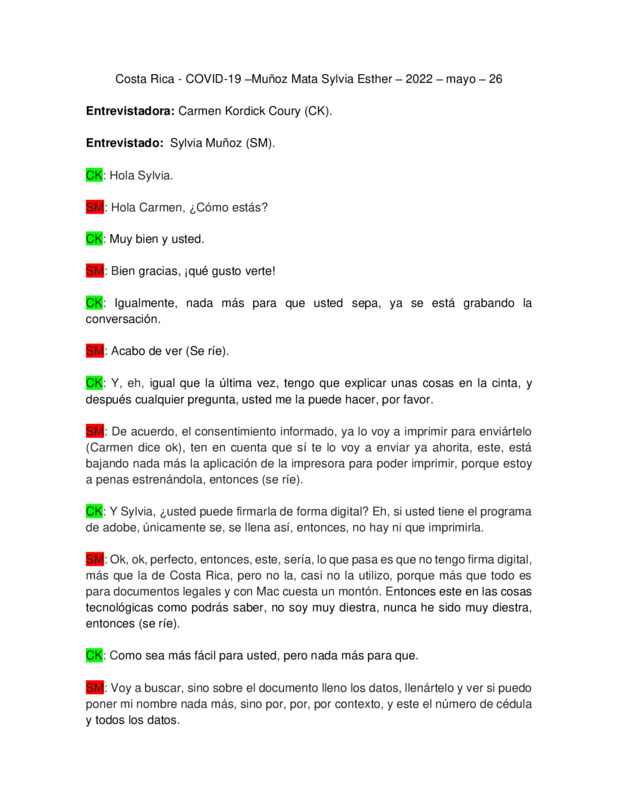 05/26/2022
05/26/2022Silvia Muñoz Mata Oral History, 2022/05/26
En esta entrevista Silvia Muñoz Mata es entrevistada por Carmen Kordick Coury concerniente al covid-19 en Costa Rica. Para empezar, Silvia habla de las cosas que habían cambiado desde el año anterior. Habla de su hogar y como se sintió cuando se enfermó. De la vacuna, teorías conspirativas, y del gene antivacunas incluyendo su novio. De allí, Silvia habla de su trabajo, de la salud mental, el abuso y violencia doméstica. Hablan de cuestiones sociales y el tema de la economía, gente sin trabajo y inflación. Pasan el tema de la inflación, la política, las elecciones y los candidatos. También hablan del gobierno, pensiones de lujo, hospitales y salud y el uso de las mascarillas. Para terminar, hablan de las fuentes principales de información y del futuro. -
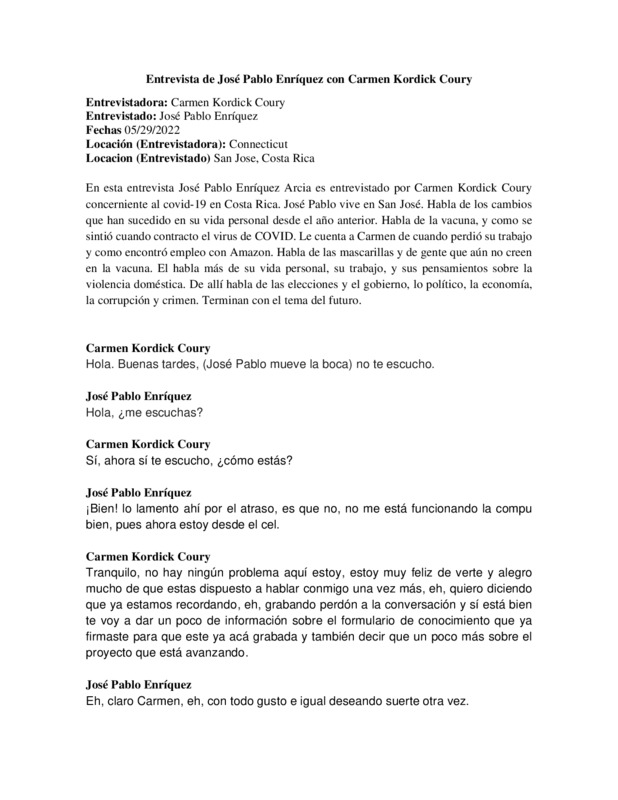 05/29/2022
05/29/2022José Pablo Enriquez Arcia Oral History, 2022/05/29
En esta entrevista José Pablo Enríquez Arcia es entrevistado por Carmen Kordick Coury concerniente al covid-19 en Costa Rica. José Pablo vive en San José. Habla de los cambios que han sucedido en su vida personal desde el año anterior. Habla de la vacuna, y como se sintió cuando contracto el virus de COVID. Le cuenta a Carmen de cuando perdió su trabajo y como encontró empleo con Amazon. Habla de las mascarillas y de gente que aún no creen en la vacuna. El habla más de su vida personal, su trabajo, y sus pensamientos sobre la violencia doméstica. De allí habla de las elecciones y el gobierno, lo político, la economía, la corrupción y crimen. Terminan con el tema del futuro. -
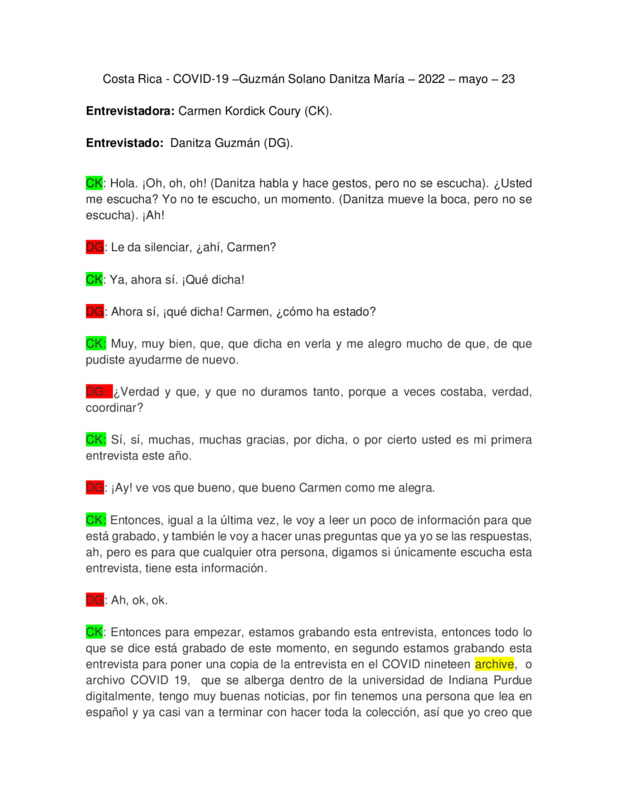 05/23/2022
05/23/2022Danitza Guzman Solano Oral History, 2022/05/23
En esta entrevista Danitza Guzman Solano es entrevistada por Carmen Kordick Coury concerniente al covid-19 en Costa Rica. Hablan de los cambios que han ocurrido desde el año anterior. Hablan del ministerio de educación, de sus estudiantes y de las mascarillas. De la salud mental, el estado mental de sus estudiantes y como van en sus estudios. Danitza también habla de la información falsa y el gobierno. Habla de su familia, su comunidad y su vida social. También hablan de la economía y fuentes de información donde ella recibe sus noticias. Para terminar hablan de las elecciones, lo político, y el futuro. -
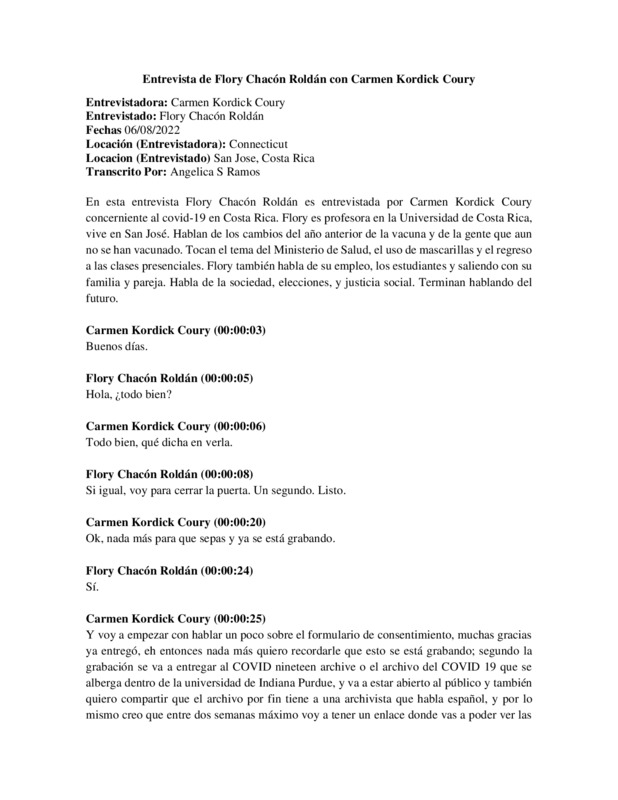 06/08/2022
06/08/2022Flory Chacón Roldán Oral History, 2022/06/08
En esta entrevista Flory Chacón Roldán es entrevistada por Carmen Kordick Coury concerniente al covid-19 en Costa Rica. Flory es profesora en la Universidad de Costa Rica, vive en San José. Hablan de los cambios del año anterior de la vacuna y de la gente que aun no se han vacunado. Tocan el tema del Ministerio de Salud, el uso de mascarillas y el regreso a las clases presenciales. Flory también habla de su empleo, los estudiantes y saliendo con su familia y pareja. Habla de la sociedad, elecciones, y justicia social. Terminan hablando del futuro. -
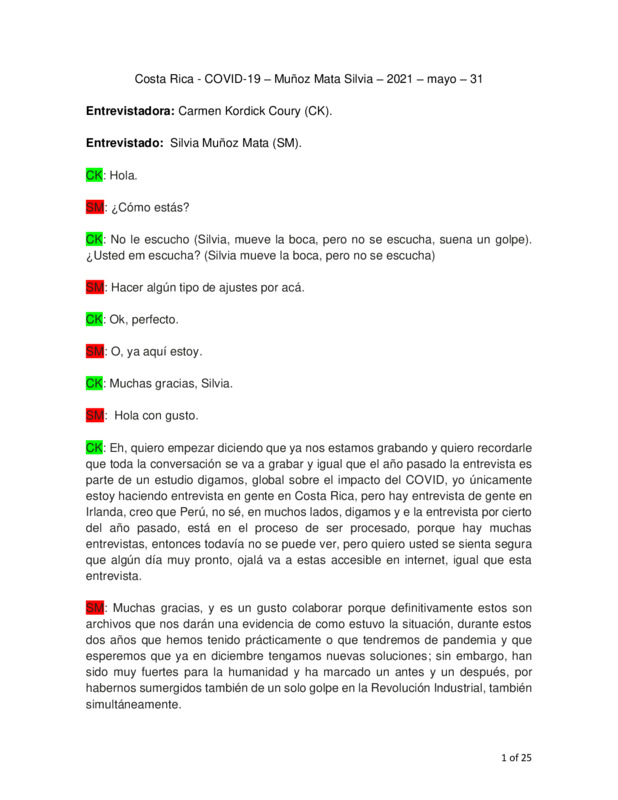 05/31/2021
05/31/2021Silvia Muñoz Mata Oral History, 2021/05/31
En esta entrevista Silvia Muñoz Mata es entrevistada por Carmen Kordick Coury concerniente al covid-19 en Costa Rica. Empiezan hablando de los cambios que habían ocurrido desde el ano anterior. Hablan del trabajo y el trabajo virtual. De la violencia domestica y otros problemas que existen en la sociedad. De allí hablan del crimen, violencia y las divisiones económicas que existen alrededor de ella. Hablan de las vacunas, gente conocida que no se quiere vacunarse y las teorías conspiratorias que existen sobre las vacunas. De allí hablan del gobierno, familia y salud física y mental. Para terminar hablan de narcotraficantes y del futuro. -
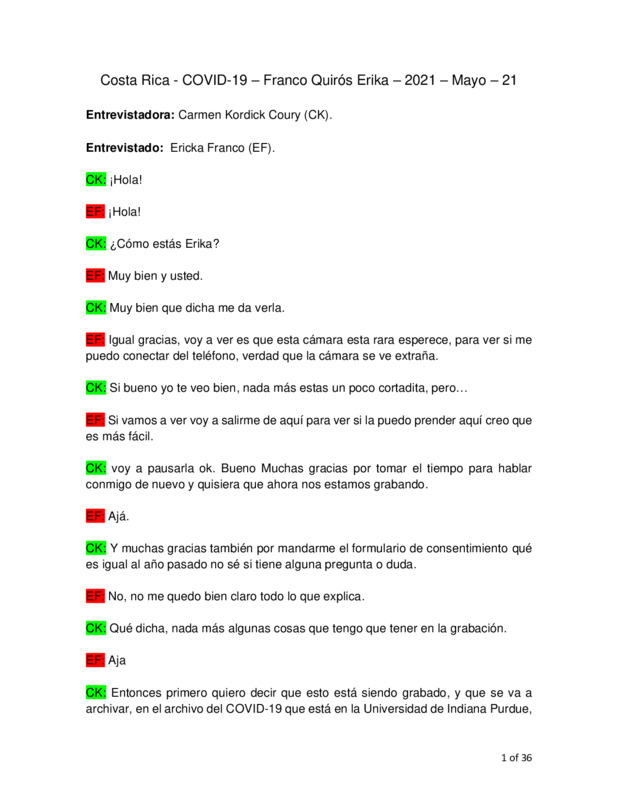 05/21/2021
05/21/2021Erika Franco Quirós Oral History, 2021/05/21
En esta entrevista Erika Franco Quirós es entrevistada por Carmen Kordick Coury concerniente al covid-19 en Costa Rica. Habla del regreso al trabajo presencial y los protocolos que tiene que seguir en el trabajo. Habla de las vacunas, del gobierno y de las personas que viajan para vacunarse. También habla de los cambios que ha visto en la sociedad, de la gente que son contra la vacuna, su familia y vida personal. Erika también habla del uso de la máscara y del ministro de salud. Para terminar, ella habla de las fuentes principales de noticias que usa, de las noticias falsas y de el futuro. -
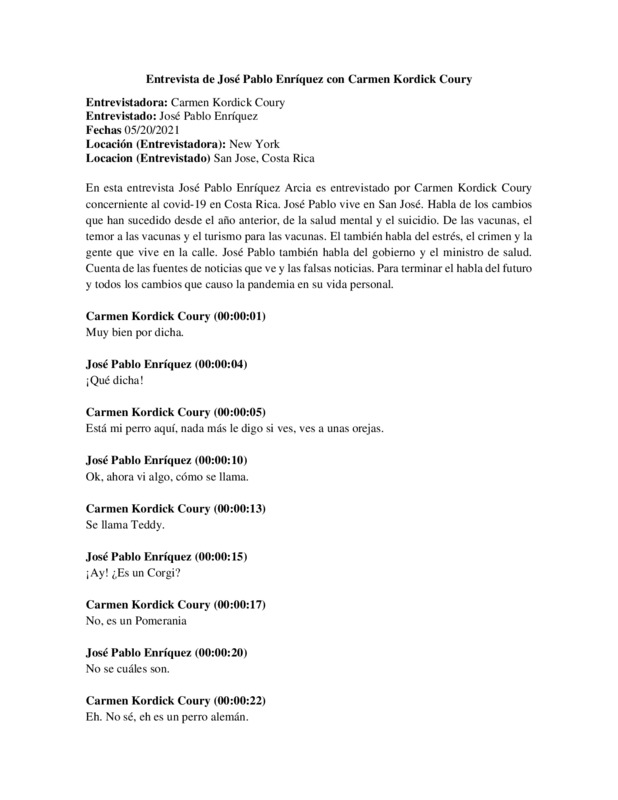 05/20/2021
05/20/2021José Pablo Enriquez Arcia Oral History, 2021/05/20
En esta entrevista José Pablo Enríquez Arcia es entrevistado por Carmen Kordick Coury concerniente al covid-19 en Costa Rica. José Pablo vive en San José. Habla de los cambios que han sucedido desde el año anterior, de la salud mental y el suicidio. De las vacunas, el temor a las vacunas y el turismo para las vacunas. El también habla del estrés, el crimen y la gente que vive en la calle. José Pablo también habla del gobierno y el ministro de salud. Cuenta de las fuentes de noticias que ve y las falsas noticias. Para terminar el habla del futuro y todos los cambios que causo la pandemia en su vida personal. -
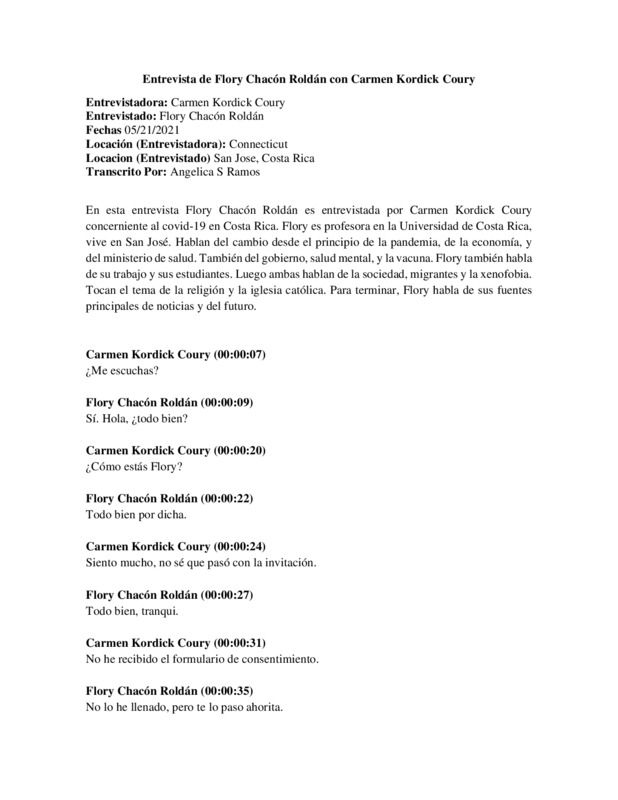 05/21/2021
05/21/2021Flory Chacón Roldán Oral History, 2021/05/21
En esta entrevista Flory Chacón Roldán es entrevistada por Carmen Kordick Coury concerniente al covid-19 en Costa Rica. Flory es profesora en la Universidad de Costa Rica, vive en San José. Hablan del cambio desde el principio de la pandemia, de la economía, y del ministerio de salud. También del gobierno, salud mental, y la vacuna. Flory también habla de su trabajo y sus estudiantes. Luego ambas hablan de la sociedad, migrantes y la xenofobia. Tocan el tema de la religión y la iglesia católica. Para terminar, Flory habla de sus fuentes principales de noticias y del futuro. -
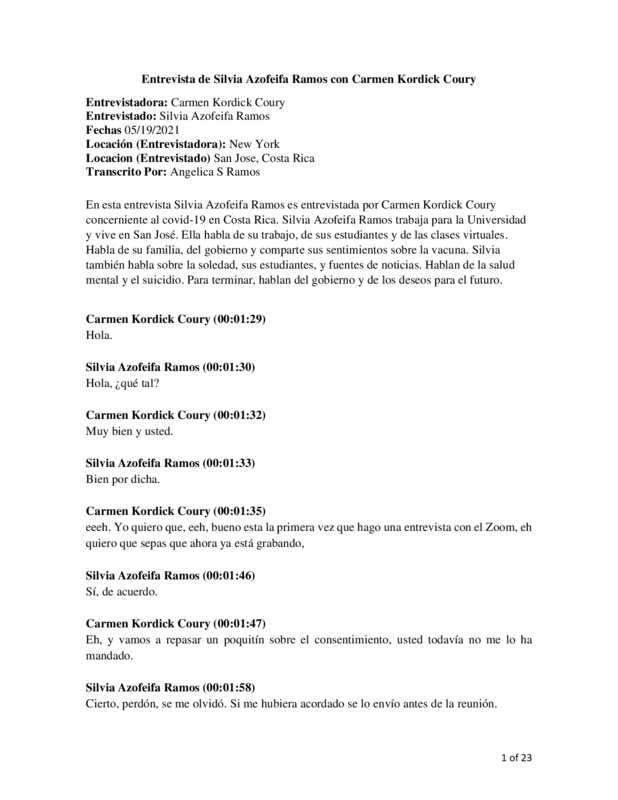 05/19/2021
05/19/2021Silvia Azofeifa Ramos Oral History, 2021/05/19
En esta entrevista Silvia Azofeifa Ramos es entrevistada por Carmen Kordick Coury concerniente al covid-19 en Costa Rica. Silvia Azofeifa Ramos trabaja para la Universidad y vive en San José. Ella habla de su trabajo, de sus estudiantes y de las clases virtuales. Habla de su familia, del gobierno y comparte sus sentimientos sobre la vacuna. Silvia también habla sobre la soledad, sus estudiantes, y fuentes de noticias. Hablan de la salud mental y el suicidio. Para terminar, hablan del gobierno y de los deseos para el futuro. -
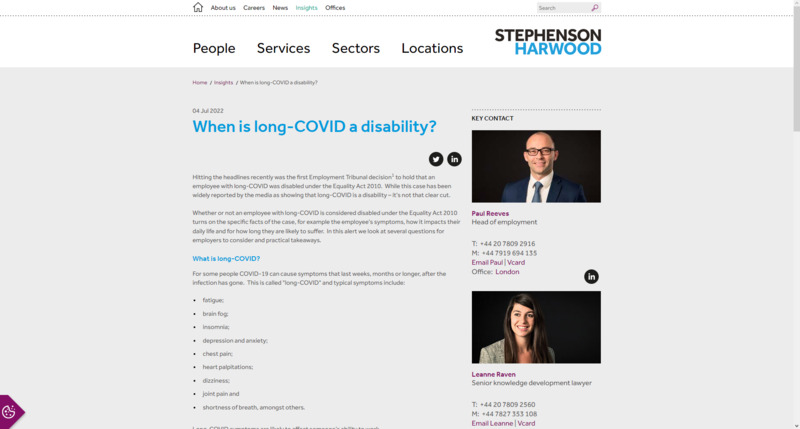 2022-07-04
2022-07-04When is long-COVID a disability?
This is a news story from Stephenson Harwood, a law firm with its headquarters in London. This is on the classification of long-COVID as a disability. Using the Equality Act from 2010, it classifies a disability as physical or mental impairment which would prevent someone's ability to carry out daily activities. Using a case of Burke v Turning Point Scotland, it describes Mr. Burke developing long-COVID symptoms, which prevented him from doing work. He describes immense fatigue, where tasks like showering would become exhausting. Due to this, he remained off work, with his sick pay ending around June 2021. In August 2021, he was dismissed on grounds of ill health. The ruling with the Scottish Employment Tribunal declared that between November 25, 2020 and August 13, 2021 that Mr. Burke was disabled. For his specific case, he can now file disability discrimination against the company, but it does not mean the employer discriminated. The law firm suggests that employers develop methods to better serve employees that could end up having long-COVID. Some of these suggestions include: change in policies around disability services, changes in communication to handle an employee suffering from long-COVID, and a supportive environment where employees will feel comfortable giving updates on their symptoms. -
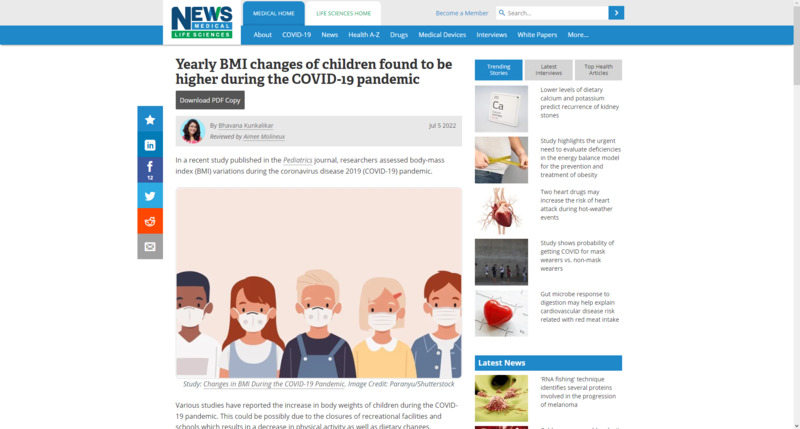 2022-07-05
2022-07-05Yearly BMI changes of children found to be higher during the COVID-19 pandemic
This is a news story from News Medical Life Sciences by Bhavana Kunkalikar. In a study published by the Pediatrics journal, researchers looked at the BMI variations during the COVID-19 pandemic. The study found that compared to the baseline measurements used pre-pandemic, the pandemic showed an increase in BMI that was .24 higher than the baseline. Higher rates of BMI increased in already obese children compared to children of a healthy weight. This article does not mention the social factors that would have contributed to weight gain during the pandemic, but not being able to socialize as often probably was a large contributor. From my own personal experience, I notice some people that I knew prior to the pandemic, and noticed that they put on some weight after the pandemic. Granted, this was what I noticed in adults I knew, not kids. Regardless, I believe that even if someone were to eat the same way they did pre-pandemic, but not exercise like they used to during the pandemic, they are bound to put on a bit of weight from lack of activity. Hopefully, with things being less restricted in some places, it will allow people to do things they did pre-pandemic more often and get back to healthier weights. -
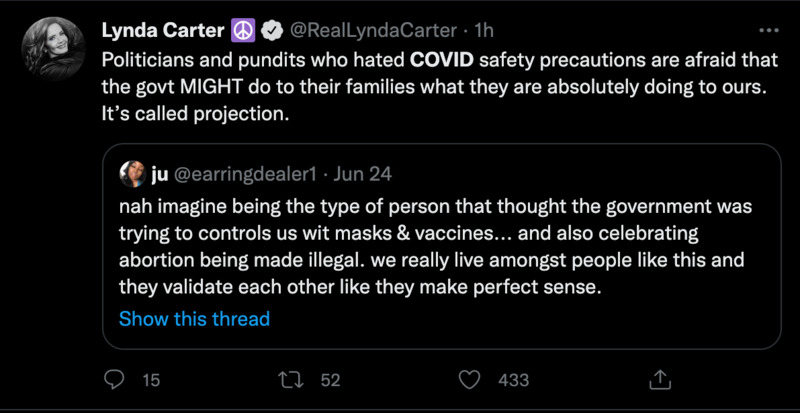 2022-06-25
2022-06-25It's called projection
This is a tweet from RealLyndaCarter. Lynda Carter is famous for her role in the Wonder Woman TV series. Here, she is expressing anger at those who hated COVID safety precautions wanting to control what people do with their health on abortion. -
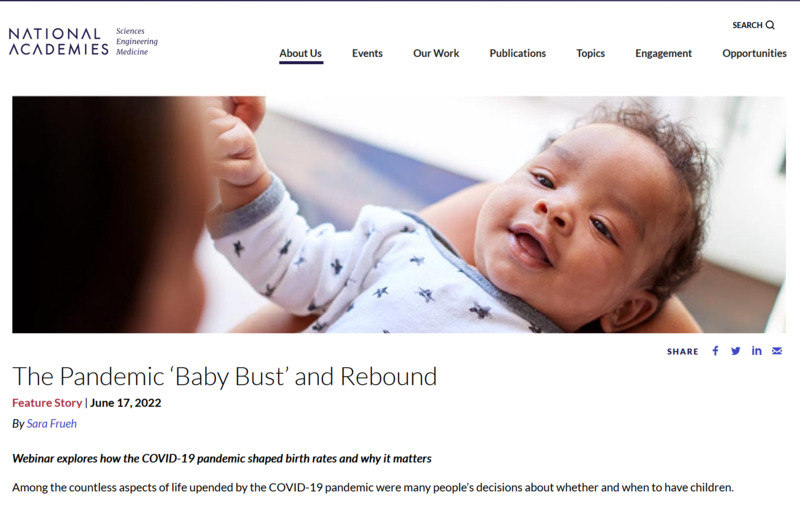 2022-06-17
2022-06-17The Pandemic ‘Baby Bust’ and Rebound
This is a news story from National Academics by Sara Frueh. It goes over the data of births throughout the pandemic. Melissa Kearney, a professor of economics at the University of Maryland, says that there was this idea at the beginning of the pandemic that it would lead to a baby boom with people being forced to stay home, but it did not. She adds that closed or limited facilities at the height of the pandemic maybe impacted some people. To support the claim, she brings up the pandemic from 1918-1919 and how that also led to decreased birth rates. An analysis of the data from Kearney states there were 62,000 fewer conceptions in the years from 2020-2021. There was a small increase in conception rates in the summer of 2020, but fell into decline again soon afterwards. The overall trend that Kearney sees with the birth and conception rates is that is has been a steady decline after COVID. -
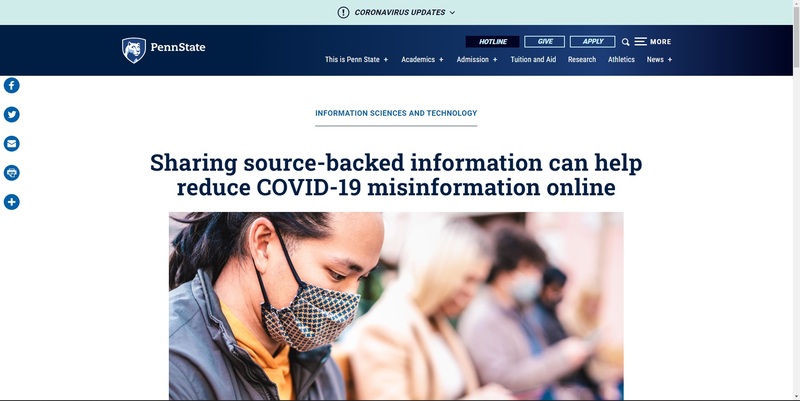 2022-06-09
2022-06-09Sharing source-backed information can help reduce COVID-19 misinformation online
This is a news story from Penn State University by Jessica Hallman. A recent study has shown that user corrections given back and forth on social media has helped reduce the spread of misinformation. Through sharing source-backed information, people were able to pick out fake news easier. -
2022-06-01
Covid-19 Through the eyes of a young adult industry worker
I remember the days leading up to lock down, one of my professors was warning us that if need be we would effortlessly be able to transition the remaining weeks of class online. To my peers and I, we thought that was a little extreme to talk to us about going remote, we didn't think something that was happening in another continent would reach us so quickly. Fast forward a week or two, work was so slow we were ordering food and sitting around talking for the entirety of our shift. At the time I was a host and was getting paid hourly so I didn't mind but I didn't think about the way it was affecting our bartenders and servers. Within the next two days we were shutdown and I was filing for unemployment. Interestingly enough, that time was the most money I've ever made in my life. I was collecting 2-3x more money than I would have gotten if I was working. I changed my life style, I started nannying once August of 2022 came around because I couldn't afford to only have my hourly host pay once things started to open back up again. I was eventually given a promotion at work to Bartend once my nanny family no longer needed me since they were comfortable with the kids going back to school and day care. I was making a livable wage but it was nothing compared to what sales were before covid. It was never consistent, when the numbers began to spike people, reasonably so, would stay home and money was tight. I was so unhappy at my current job I was despiertly seeking a new one but in January of 2022, it was still a little scary, numbers were spiking and finding a new industry job seemed next to impossible. I found one but it came with a lot of consequences. I struggled financially for months. If it wasn't for the support of my family, I wasn't sure if I would have been able to make rent, pay my car, or even feed myself. Thankfully as the months have gone on it's gotten better. It's now June of 2022; over two years since the pandemic first started, and while nothing is normal, it's the closest it's ever been. Those who were once in the same position as me, scared of how they were going to survive are back to making livable wages. But I won't lie, I'm still scared, there is no certainty or promise that things will stay as "normal" as they are this 2022 summer. All we can do is hope and pray, and be thankful and grateful we're here to talk about it. -
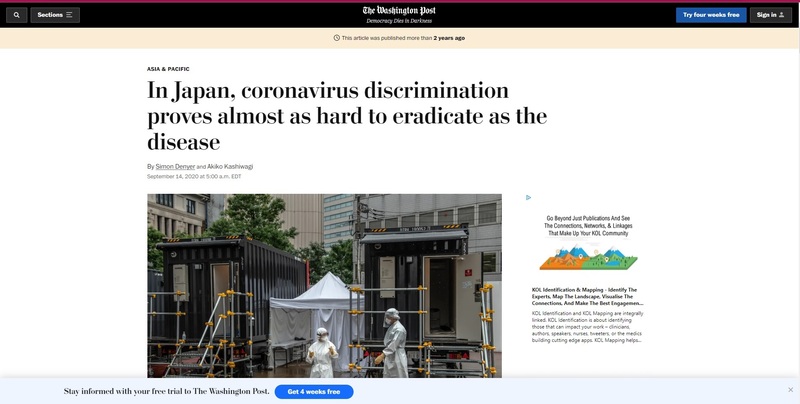 2022-05-16
2022-05-16Stigma During the COVID-19 Pandemic in Japan
During the COVID-19 pandemic, healthcare workers and patients in Japan suffered from the stigma. According to the article, “In Japan, coronavirus discrimination proves almost as hard to eradicate as the disease,” healthcare workers and their families are discriminated against as if they are “germs” that people need to avoid contact with. The patients of the virus are also stigmatized, and such a phenomenon of blaming victims has been seen many times throughout Japanese history. As this article represents, health care workers in Japan were stigmatized and discriminate against because of the potential risks of COVID-19 infections. According to Goffman, the greek definition of stigma “[refers] to bodily signs designed to expose something unusual and bad about the moral status of the signifier” (131). Nowadays, its definition has expanded to negative images of physical and social attributes and their interpretation in a social context. The stigma of healthcare workers in Japan is peculiar to this pandemic, and this could be because the situation overturned the expectations people had about healthcare workers. Healthcare workers are supposed to help people with diseases, but because of the pandemic, they are seen as the ones with higher risks of carrying the virus as they have more interaction with those who have been infected. As a result, people become afraid of interacting with healthcare workers, which made this job stigmatized. The article shows that Japanese people reject to interact with healthcare workers and their families during the pandemic. One of the common consequences of being stigmatized is that stigmatized people become separated from other people as they are treated differently. According to Goffman, “[the] responses of the normal and of the stigmatized that have been considered so far are ones which can occur over protracted periods of time and in isolation from current contacts between normals and stigmatized" (135). As Goffman illustrates, health care workers were stigmatized and separated from society at the beginning of the pandemic. Some people even believe that “the person with a stigma is not quite human” as Goffman states, which lead to an extreme reaction by people around health care workers. For instance, healthcare workers have been receiving death threats because other people see them as if they are the potential source of the disease rather than the same humans who are fighting the pandemic together. Such a reaction is similar to how children bully other children based on differences in attributes. One of the typical ways of bullying is to call someone “germs” and avoid interactions, which is the same as the situation in this article. This pandemic revealed our natural tendency of staying away from others who have negative attributes, which indicates that a pandemic is not an equalizer but a source of discrimination. Another factor that could have contributed to the situation in Japan is social pressure existing in the country. The article mentions that there is strong social pressure in Japan to follow coronavirus directives and to cooperate for stopping the spreading of the virus; if people do not comply, they are strongly criticized or blamed by other Japanese people. In addition, surveys have shown that compared to Americans or Britons, more Japanese people agree with the idea that “If someone is infected with the coronavirus, I think it is their fault” (Denyer and Kashiwagi). According to Fei, there are behavioral norms that are maintained by tradition, called “ritual norms” (97). This kind of norm is regarded as moral behavior by people of the community so that they follow the norms regardless of laws or punishments (99). Although Fei discusses Chinese rural society, such norms have been established in Japan as well because Japanese society developed as an agricultural society where people in a community need to cooperate with each other. There used to be a tradition called murahachibu, which means excluding those who break the rules from 80 percent of social activities in the village with the exception of funerals and fires. Even though this practice is rarely seen in modern society, people still have a strong pressure to behave for the sake of society in order to maintain harmony. For example, Japanese people still feel obligated to wear masks after vaccines have been promoted even though there is no rule or punishment for not wearing masks. This feeling may occur because they believe it is moral or correct to refrain from doing something that possibly spreads the virus. Healthcare workers were not the only people who suffered from stigma, but COVID-19 patients were also blamed for their behavior that possibly contributed to their infection. In the article, a Japanese psychology professor mentions “a low tolerance for uncertainty” in Japanese people, indicating that they blame the patients to reduce their own fears derived from the uncertainty of the pandemic. This implies that COVID-19 patients become scapegoats for the pandemic itself. In the reading, Trauner writes that “the general acceptance of the germ theory in the 1880’s did little to dispel the popular belief that epidemic outbreaks were directly attributable to conditions within Chinatown” (73). This indicates that when people are uncertain about something scary, they try to identify what or who causes that disease or threat. Although people know that coronavirus is the cause of this pandemic, most people are afraid of germs and viruses because they are invisible. The article also demonstrates some cases of blaming victims in Japanese history, including leprosy patients, survivors of the 1945 atomic bombings, and evacuees of the 2011 Fukushima disaster. Such diseases and disasters involve complicated factors, so it is difficult to blame the causes directly. Therefore, individuals tend to blame patients or carriers of the virus during the pandemic instead of blaming the virus itself because they are visible and easy to avoid. References Erving Goffman (1976) “Stigma” :Chapter 10 “Selections from Stigma” Fei Xiaotong (1947) “From the Soil: the Foundations of Chinese Society” Joan B. Trauner, (1978) “The Chinese as Medical Scapegoats in San Francisco, 1870-1905 Simon Denyer and Akiko Kashiwagi (2020) “In Japan, coronavirus discrimination proves almost as hard to eradicate as the disease” -
 2022
2022Teacher Burnout is Real
826 National is a non-profit organization focused on helping students with their writing skills. In this post, they highlight statistics related to teacher burnout and stress during the second year of the pandemic. One of the most alarming statistics is that 90% of teachers that participated say that teacher burnout is a serious issue. The pandemic has exacerbated the stress put on educators and they have received little support in return. -
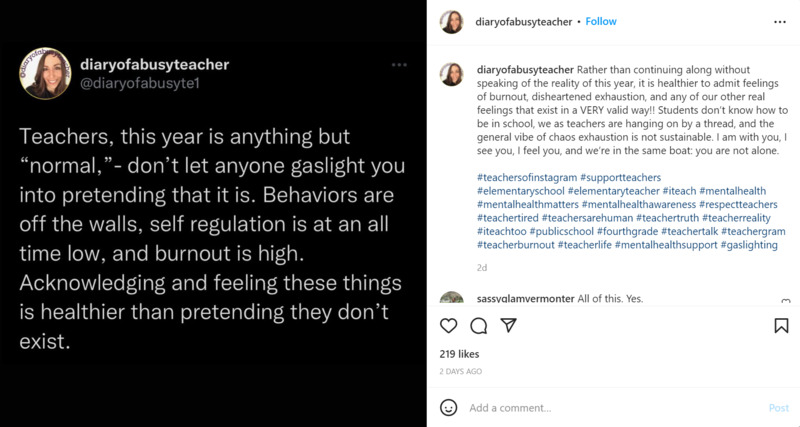 2022
2022Not a Normal Year for Teachers
This post shows an example of teachers supporting each other through the end of the 2022 school year. In many different places, people are acting as if life is "normal" again. Schools are not requiring masks or sanitation procedures, school is in session like normal, in-person assemblies, activities, and sports are occurring. However, teachers can definitely tell that everything is not normal, and our job continues to be increasingly more difficult. -
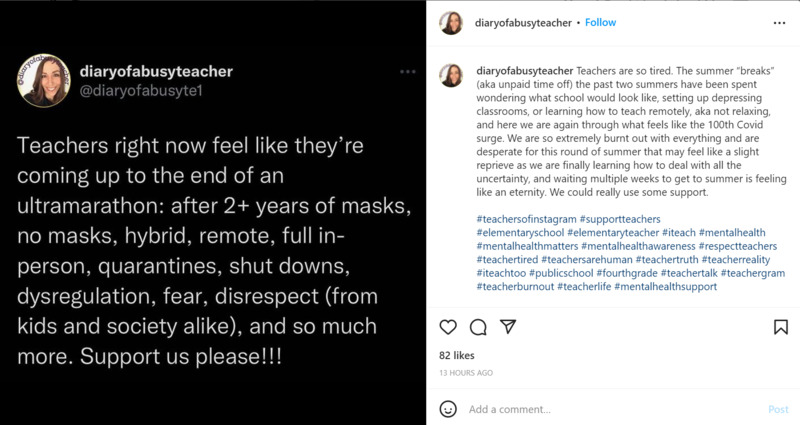 2022
2022Teachers are Tired
Now that we are ending the 2022 school year, many people have "returned to normal". Most students no longer wear masks in schools. However, we are still working through the pandemic. Teachers are still at risk for contracting COVID and are navigating the severe behavioral problems of students. With summer approaching, everyone is looking forward to a break from an extremely stressful year. -
 2022-01-10
2022-01-10Criticizing Teachers
Even before the pandemic, many teachers have felt that they are underappreciated. During the pandemic, the number of responsibilities on teachers increased. They have been forced to teach during a health crisis, putting themselves at risk. When teachers are sick, the remaining teachers are forced to pick up the work without any empathy if they are not able to fulfill all obligations. The expectations have increased as teachers are also battling increasing behavior issues. -
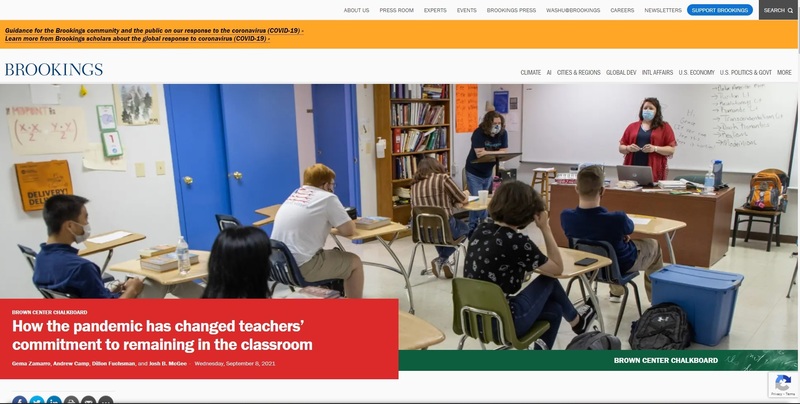 2021-09-08
2021-09-08How the Pandemic Has Changed Teachers' Commitment to Staying in the Classroom
According to the article, there was a 16% national turnover rate for teachers before the pandemic. A survey given in January 2021 shows that almost 25% of teachers stated that they wanted to leave teaching. Pre-pandemic surveys and surveys given during the pandemic also show that less teachers believe that they will stay in education until retirement. The pandemic has required that teachers maintain the same responsibilities, while also piling on constant communication with parents (even without a response), social-emotional lessons, plans for asynchronous and synchronous learning, teaching students virtually and in-person at the same time, keeping up with changing health and safety regulations, and having to deal with increasing behavior issues. -
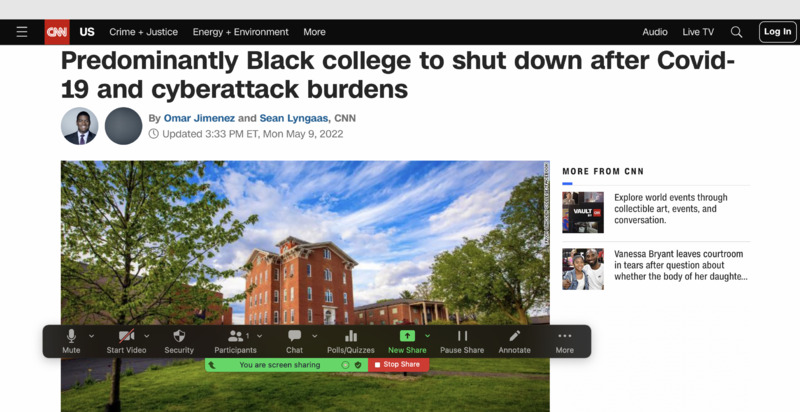 2022-05-09
2022-05-09Predominantly Black college to shut down after Covid-19 and cyberattack burdens
This is a news story from CNN by Omar Jimenez. After more than 150 years, Lincoln College in Illinois will be closing its doors due to struggles on cyber attacks and COVID. This college is significant because it was the only college to be named after Abraham Lincoln when he was still alive, according to the US Department of Education. COVID created many economic burdens for the college with the transition to remote learning. COVID also created drops in enrollment. -
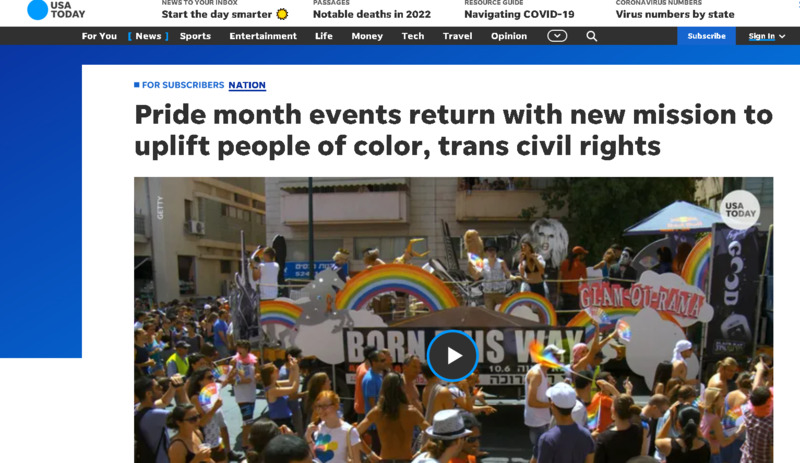 2022-04-19
2022-04-19Pride month events return with new mission to uplift people of color, trans civil rights
This is a news story from USA Today by Bill Keveney. Pride parades will be returning to full-scale since 2019. With the events that happened during COVID, some changes have been made in how it is celebrated. For 2022, more people of color and trans people have been added to leadership positions. Participation is also going to be more accessible for disabled and low-income as well, by making some events online for easier access. Police brutality will also be addressed due to the Black Lives Matter protests of 2020. Seattle Pride has banned police from Pride. Along with this, there is also the theme of speaking out against the anti-LGBTQ legislation that is happening across the United States. -
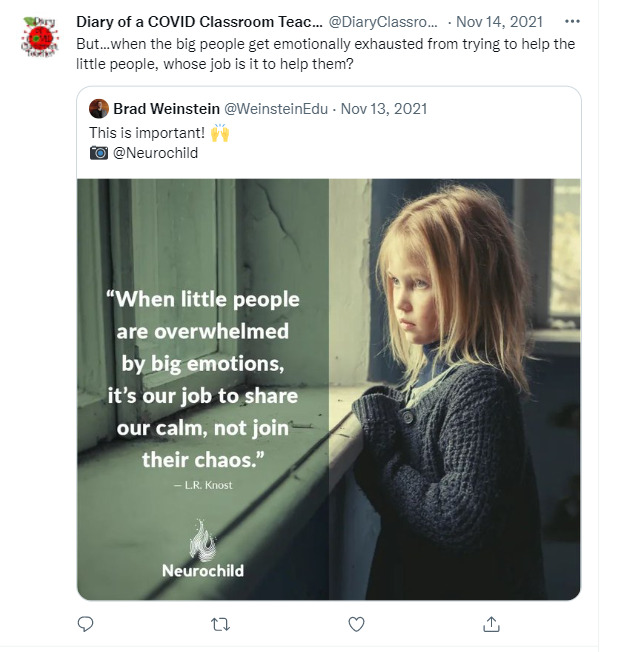 2021-11-14
2021-11-14Emotionally Exhausted Teacher
This item is a screenshot from a Twitter account known as the Diary of a COVID Classroom Teacher. This account's response to a picture about children with big emotions shows the frustrations that many teachers are facing during the pandemic. Many students have struggled due to the lack of routine and disruptions in their lives caused by COVID-19. Throughout the nations, behavior issues are being seen. Teachers are struggling more than ever while they try to help these students who are acting out while also staying on top of their other responsibilities. -
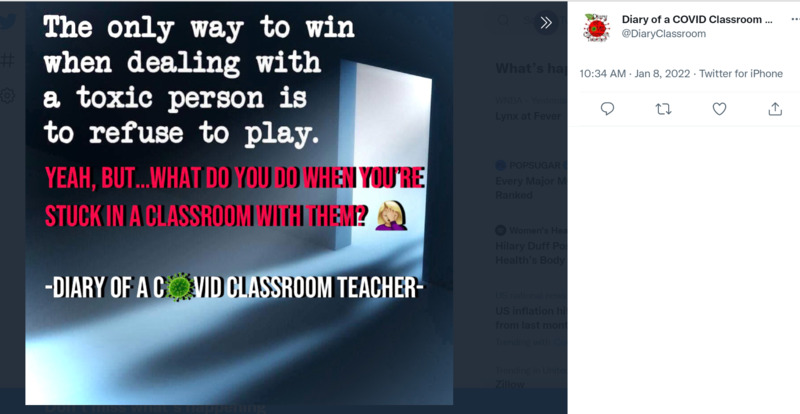 2022-01-08
2022-01-08Frustrations of a Teacher
The item is a screenshot from a Twitter post of someone known as "Diary of a COVID Classroom Teacher". For their post, they had edited a motivational photo to question how to handle a toxic person if they are in your classroom. This post expresses frustrations that are shared by many teachers during the pandemic. With many schools being entirely in-person for the first time in two years, teachers are experiencing a huge amount of behavior issues, most likely caused by lack of routine and social/emotional growth during this time. -
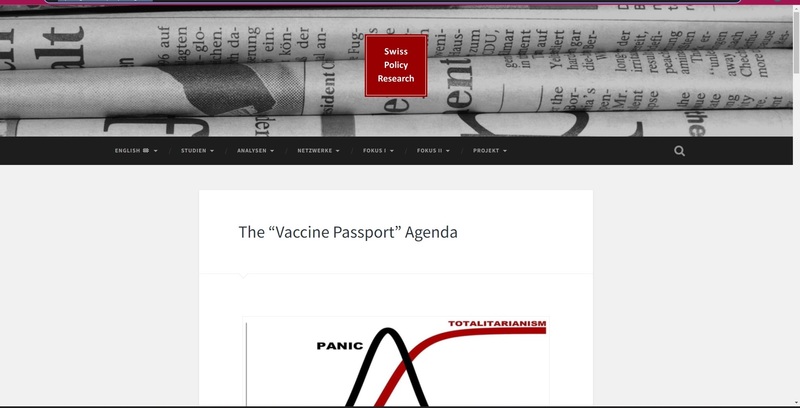 2021-12
2021-12The “Vaccine Passport” Agenda
This is information on vaccine passports by Swiss Policy Research. The overall message is that there is a correlation between totalitarianism and panic over the virus. This panic, in turn, has translated into governments around the world bringing up the possibility of vaccine passports. The vaccine passports may be used for more than vaccines, as they would be a way for the government to identify movement of individuals easier. The groups uses a number of ways to sway the audience, using information on what different organizations have funded, in addition to bringing up what other governments have said about the vaccine passports. Vaccine passports, according to this publication, really got traction from the digital identity lobby group ID2020 in February 2021, which has funding from both the Gates Foundation and the Rockefeller Foundation. The research foundation cites pushback against the vaccine passports too. Places like Ontario, Canada have had to take away the vaccine mandate for healthcare workers, as they would potentially lose many workers in the process. In Spain, they have been called "ineffective and unconstitutional." The publication ends by calling the pandemic a "plandemic," saying that it was likely lab-created for the purpose of controlling the populations more. I think given the information available, this is persuasive. There are links to where the claims come from, such as what Bill Gates says himself, as well as information on the Good Health Pass, which is a collaboration between many different organizations and their implementation of vaccine passports. In my own opinion, I find vaccine passports unconstitutional and an invasion of privacy. A vaccine passport makes it so you are forced to disclose personal health information to strangers in order to do things like grocery shopping, which I consider to be a potential HIPAA violation. It is also breech of the Fourth Amendment in the Constitution. If people feel inclined to get vaccinated, they should, but forcing people to do so through vaccine passports creates more overall distrust in the government. I have known people that would have otherwise have gotten the vaccine if it wasn't so forced. Even though vaccine passports were never mandated where I live, there have been people that have lost their livelihoods over not wanting to get vaccinated. I myself was very hesitant to get the vaccine for a while due to the way the government was handling it. Trying to implement vaccine passports and mandates has made it so society becomes more segregated, where unvaccinated would be forced to shop at different places, work at different places, and many other things. I am glad that the overall effort to actually do this has failed, but that is only because of many groups of people throughout the United States exercising their rights. I am pro-choice too, and I extend that reasoning to vaccine passports. People need bodily autonomy and vaccine mandates remove some of that. -
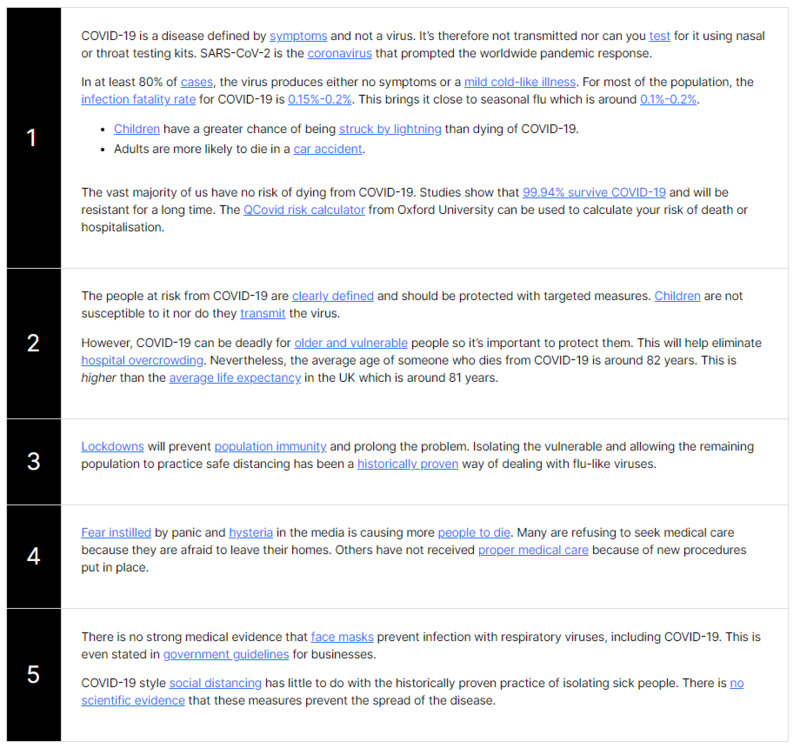 2022-05-10
2022-05-10Evidence Not Fear Key Facts Chart
The item is a chart from evidencenotfear.org. It can be found on the homepage. This chart can be found under the “key facts” section and explains the information that is claimed to be from experts in epidemiology, microbiology, and virology. The key facts section contains information that is immediately concerning to me. Some of the statements that are the most concerning to me are that children cannot transmit the virus, face masks can create negative health effects for the person wearing them, and more people have died from the panic of COVID-19 than the virus itself. The chart contains links, which I assumed would provide evidence and research to back up the claims. However, each link leads to an archive of news articles that are related to that topic. The message of this item is that the fear of COVID-19 has been worse than what the virus can actually do. This is seen through the explanations of face masks causing complications, lockdowns preventing herd immunity, and children cannot being affected by it. It tries to persuade the reader by providing links to several different news articles supporting the claim. However, the news article that they are using as support does not provide sources either. -
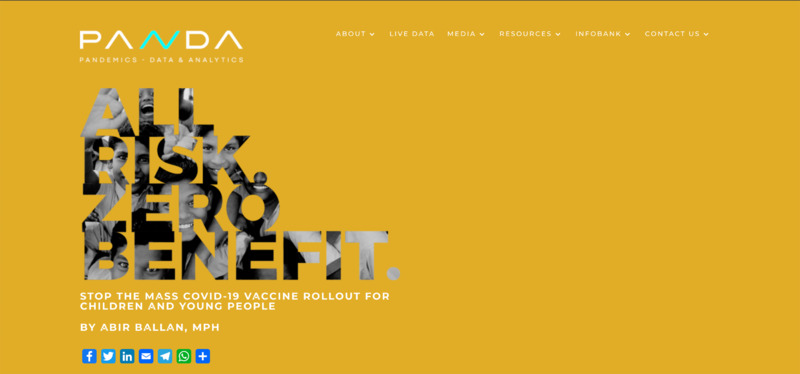 2021-06-25
2021-06-25Pandata falsehoods putting children at risk
The attached link is to an anti-covid vaxx website, specifically about not vaccinating children. The first thing you see is a list of 10 reasons not to vaccinate children, followed by a video. The main message is vaccines for children are not safe. (Which I would personally like to point out is false.) They are pushing the idea that vaccines are coercive and dangerous. The video is titled “What about the kids?”, and the page it’s listed on is titled “All Risk Zero Benefit.” First, we can look at the title of both of these to see tactics of persuasion. “What about the kids?” Exactly, what about them? This creates an emotional appeal to listen to the message, surely everyone would care about kids, and surely you want the best for them? “All Risk Zero Benefit”, a short title, to the point, definitive word choice. There is no room for argument with “zero benefit”. The video itself flashes between different news outlets and interviews with ‘experts’, Doctors. There is the continued tactic of “The other doctors don’t want you to know this”, or “The government is trying to control you”. This is truly stupid and disgusting. If you watch the video, all the clips are from either Fox ‘news’, The Epoch Times, or from something called Brees Media. Fox and Epoch are both conservative right-wing outlets. I looked into Brees Media, as I hadn’t heard of it before. It is a former BBC employee who now created a company that teaches people how to create media content. She (Anna Brees, the owner) has several tweets and Instagram posts that push this anti-vaxx mentality. People tend to trust BBC, at least more so than other news sources, so by continuing to use the Ex-BBC in her bios on everything it begins to create a buy-in for people. -
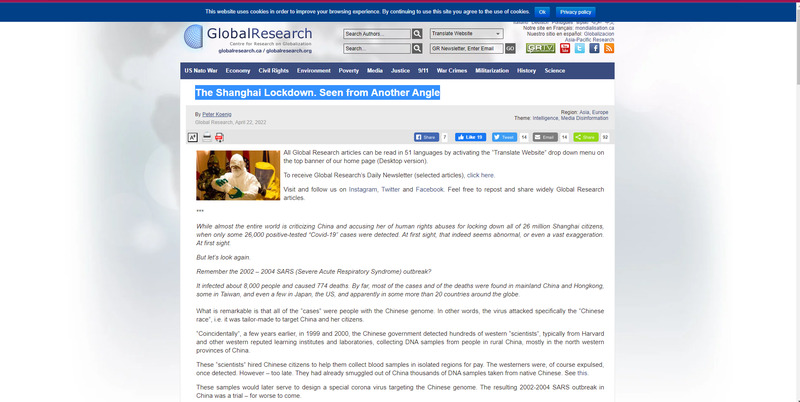 2022-04-22
2022-04-22The Shanghai Lockdown. Seen from Another Angle
This is a screenshot of an article from globalresearch.ca about looking at the most recent Shanghai Lockdown. Yet, the article does not talk about the Shanghai lockdown until maybe halfway through the article. It goes on a tirade about how the 2002-2004 SARS outbreak went after the "Chinese race" and how it became an early trial for China before COVID. Then the author states that China has "mastered the disease" and managed to reopen its economy by the end of 2020, which leads to the conclusion that China's economic growth hardly suffered during the newest outbreak. The author asserts that China will surpass the U.S. economy in 3-4 years and then launches into a world history lesson about Cold War politics. The author tends to wander in the article, going from pandemic skepticism on vaccines sterilizing women, being lied to the government, or having HIV ingredients. Then somehow, Ukraine has virus labs...I don't know. Somehow, Russia is involved in this article, but I'm not sure why. I don't know how this is supposed to persuade its audience because the author goes all over the place with his points. I suppose skeptics will like the fact that the vaccine is being questioned here? Personally, I don't even understand why skeptics would want to read this because I think they would lose even more brain cells from just trying to read it. I think this article is just a gigantic mess and it makes my brain hurt. I find myself just not understanding a single thing that is being written in this article. I don't understand why anyone would even understand or like this article. It literally makes absolutely no sense and there are even typos in it. The look of this website and article makes me want to run my virus protection at least three times because I feel like they're going to infect my computer with a Trojan horse. -
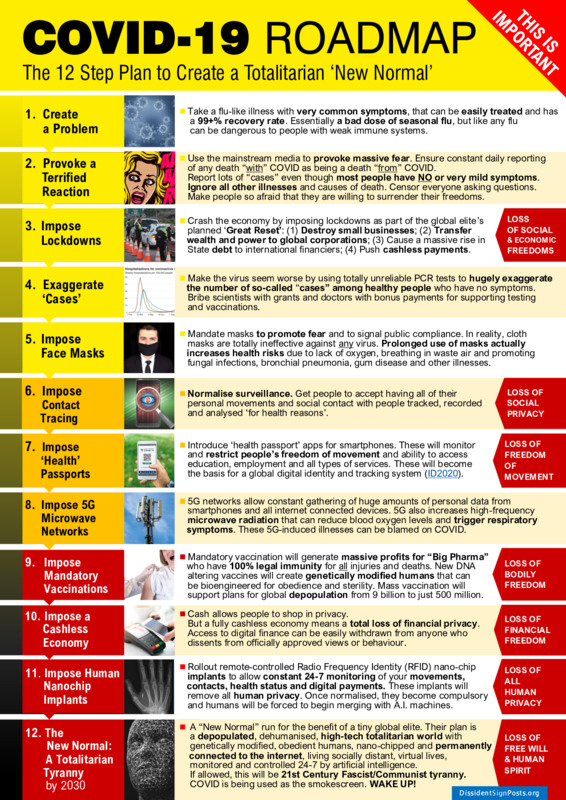 2022-05-09
2022-05-09I can't even make this up anymore
First off, I do not agree with the attached pdf to this story. When I first looked at this awful website, and saw that they had FREE DOWNLOADABLE PRINTS, I immediately sighed because this is the type of stuff that's turning people AWAY from getting a vaccine. These people are the reason why people can't trust "media". It is also very obvious that these people have never taken a history or any type of political science class in their lives. Let's analyze a little bit of what they say. First off, in their step 1 of "create a problem" they compare COVID-19 to something like the flu. Given, I'm sure people have died from the flu. I mean, the influenza pandemic was a thing in 1918. Also important that they even wore masks then! Their step 2 is "provoke a terrified reaction". What I'm getting from this is, we shouldn't be worried. But we should. Any pandemic should be worrying. I can also guarantee you as well that these people didn't give a shit when the AIDS/HIV Epidemic was literally killing so many queer people at an alarming rate, and wasn't addressed until 6 years later after it started. Anyways, the steps that talk about "contact tracing" and "health passports" things are interesting. They talk about surveillance, but surveillance has been happening since the dawn of time. I'm sure muslim's everywhere in the United States could talk more about surveillance than I could as a white person. Health passports? You have to have certain vaccines to attend public school or even a public university. Also, actual passports are a thing. You know, the thing you need to tell other people who you are and where you're from when you visit their country. I'm going to jump to step 10's "Impose a Cashless Economy," anyone that has ever handled cash during a job knows how gross cash is. This pamphlet must've been when the pandemic first happened, because that's when my last job couldn't take cash because we were too afraid to touch anything. Now knowing the information I know now, a lot of places take cash now. But also, people are gross. Half of the time, people are sneezing into their hands or not washing their hands and come out of the bathroom and go to pay and give you cash. Don't even get me started on people pulling money out of their bras. Throughout this entire pdf, they talk about the elite. Which is probably the only thing I agree with them because the rich got richer during the lockdown and even made prices higher. This type of propaganda could be harmful to someone that was already on the fence about vaccines, but the fact that this information is out there instead of the actual science based truth is harmful. It uses familiar words from history to persuade people to not get the vaccine. -
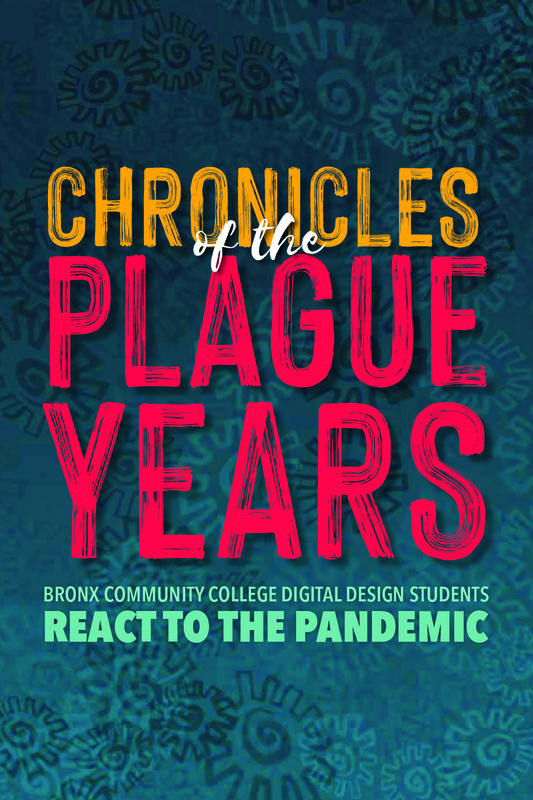 May 24, 2021
May 24, 2021Chronicles of the Plague Years
[From the Introduction] For the students, faculty, and staff at Bronx Community College, March 2020 was a sucker punch to the gut. Our vibrant campus, a beautiful haven filled with vitality and life, became a kind of petri dish—ground zero for the COVID 19 virus to make landfall. Not only were many students and staff sickened in those early days, but the City University system was forced to close, then transition to remote learning in the space of a single week. It was a challenge, to say the least: for faculty who needed to quickly learn the tools to make it possible, and even more so for the students, who—cut off from socialization and in person learning—had to adjust to this new reality. Stranded in their homes, some students were forced to continue working frontline jobs, while others lost jobs and income, facing financial devastation. Students were confronted with their own illness as well as that of family members. Online learning was fraught in those early days. As a community, we improvised our way forward, without the proper technology and knowhow to do it. But two years on, our students have proven their resilience. In time, we adapted to remote learning, to new ways of doing things, of coping. 2020 was harder, and in 2021, the challenges continued. But, somehow, we got through. These student books provide a glimpse into the minds of the talented BCC Digital Design students who persevered, strived, and thrived. -
2022
Experience of COVID-19 in China and USA
As an international student, I have witnessed the spread of covid-19 in both China and the United States. While the virus harms humans in the same way, each country does it differently to humans facing the pandemic. I was in high school in Boston when the covid first broke out (in December?). At that time, there were only two cases in Boston, so everyone didn't care much about the virus far across the ocean. As a Chinese, I know that coronavirus has caused countless pain in Wuhan, China. Therefore, I wrote a petition to the school to advocate wearing masks at school to avoid infection. However, the absurdity of things is far beyond my imagination. My high school principal sent an email to all international students (most of us are Asians) telling us that masks do not help people stay away from the virus. He also required us not to wear masks in school because it would cause panic among other local students. This implicit discrimination against Asians is a hurt. In March, I decided to return to China from the US to visit my family. It was a tough decision, not only in the sense of risking my life but in the process. I overcame the flight's cutting off and was cancelled by seven flights to get on the plane home. But when I finally returned to China and was quarantined for 14 days, I discovered the maliciousness toward international students on the Internet. Everyone was repeating the sentence, "you can't serve the motherland, but you can be the first to poison your country flying from thousands of miles away". This exclusion of outsiders is another harm. These hurt far more than covid did to me. -
2020-03-20
Life of a Retail Worker During COVID-19
Throughout the entire pandemic, I worked in retail (specifically at the "Meijer" grocery store). As essential workers, it was frightening going to work and exposing myself to illness while many others stayed home in quarantine. I went to work and was met with frantic customers panic buying everything and anything they could find - the meat aisles were empty. The bread was gone. There wasn't a roll of toilet paper to be found. Although stock of popular items was low on a national level, we still received questions about when we would be getting more shipment in. It seemed as though people were gearing up for an apocalypse rather than a pandemic. We went around cleaning constantly, wiping and spraying down every surface we could find. Masks were mandated and giant plexi-glass shields were installed in the check-out lanes. It was incredibly difficult to work alongside others who were absolutely terrified - I was worried that I would do something wrong and set them off. Working throughout the pandemic completely wore me out and shed light on who people become when they're scared. -
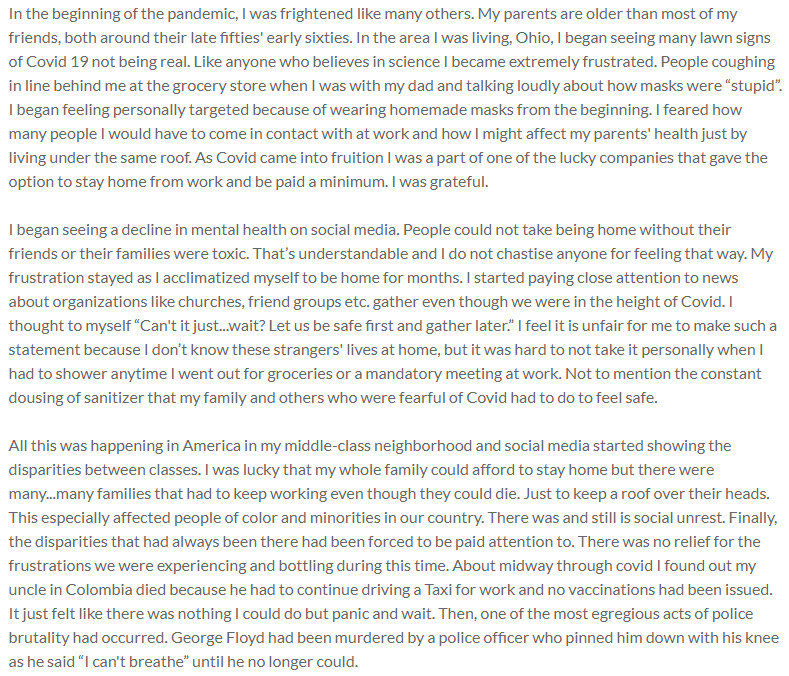 2020-06-01
2020-06-01A privilaged white latina women.
In the beginning of the pandemic, I was frightened like many others. My parents are older than most of my friends, both around their late fifties' early sixties. In the area I was living, Ohio, I began seeing many lawn signs of Covid 19 not being real. Like anyone who believes in science I became extremely frustrated. People coughing in line behind me at the grocery store when I was with my dad and talking loudly about how masks were “stupid”. I began feeling personally targeted because of wearing homemade masks from the beginning. I feared how many people I would have to come in contact with at work and how I might affect my parents' health just by living under the same roof. As Covid came into fruition I was a part of one of the lucky companies that gave the option to stay home from work and be paid a minimum. I was grateful. I began seeing a decline in mental health on social media. People could not take being home without their friends or their families were toxic. That’s understandable and I do not chastise anyone for feeling that way. My frustration stayed as I acclimatized myself to be home for months. I started paying close attention to news about organizations like churches, friend groups etc. gather even though we were in the height of Covid. I thought to myself “Can't it just...wait? Let us be safe first and gather later.” I feel it is unfair for me to make such a statement because I don’t know these strangers' lives at home, but it was hard to not take it personally when I had to shower anytime I went out for groceries or a mandatory meeting at work. Not to mention the constant dousing of sanitizer that my family and others who were fearful of Covid had to do to feel safe. All this was happening in America in my middle-class neighborhood and social media started showing the disparities between classes. I was lucky that my whole family could afford to stay home but there were many...many families that had to keep working even though they could die. Just to keep a roof over their heads. This especially affected people of color and minorities in our country. There was and still is social unrest. Finally, the disparities that had always been there had been forced to be paid attention to. There was no relief for the frustrations we were experiencing and bottling during this time. About midway through covid I found out my uncle in Colombia died because he had to continue driving a Taxi for work and no vaccinations had been issued. It just felt like there was nothing I could do but panic and wait. Then, one of the most egregious acts of police brutality had occurred. George Floyd had been murdered by a police officer who pinned him down with his knee as he said “I can't breathe” until he no longer could. America turned upside down. We saw videos of buildings being destroyed, fires, mass protests, shootings, the worst you could imagen. As a collective we had reached our boiling point and the last straw was this murder. My family was against my brother and I protesting because Covid still being at its height. I have protested at the Womens March in D.C and several pro-choice marches in Ohio but the Black Lives Matter movement was something I needed to educate myself on and stand up for. It was a calling for someone in my position of privilege to show up in numbers for people of color that deserve rights just as the rest of us. I often reflect on how my life could have been so different. My father is Colombian, and my mother is Polish. I look white and have always been raised in a middle-class neighborhood. I have not had to face the same injustices as my father, my family and minority groups in America just based off the color of my skin. Police brutality has always been in existence but when we were all home during Covid with modern day technology and video evidence, we felt that video to the core. We felt the pure rage and frustrations as a society of how we were not being cared for in the way we thought we would have been during this pandemic. I have never witnessed in my lifetime such united support for one another. Such a strong fight against people in power who are coming after the people we call friends, workers, lovers, and family no matter the color of their skin. In such destruction, pain and chaos I had never felt such beauty in our society. I will never forget the feeling of unity around me I had felt as hundreds of people laid down on the hard pavement during the Black lives Matter protest yelling “I cant breathe.” Finally, we could help the unheard be heard and take a deep breath together. -
2022-04-29
The Pandemic in the Military
When I found out about the start of lock downs and the fact that a pandemic was even happening, I was at the end of a training rotation at Fort Irwin, CA. My colleagues and I were extremely concerned about the welfare of our families as we had all been screened for symptoms, but there was talk of us not being able to return home until the DOD had figured out exactly how they were going to respond to the “sudden” emergency. I only put sudden in quotes because the government had plenty of warning that this was coming but decided that it wasn’t worth acting on until it had already started happening. Once home, the adjustment to a new way of life was akin to being dropped in a foreign country that speaks a language you don’t understand and has none of the customs you are familiar with. While families, dependents, and civilians had had warning, albeit minimal, that lock downs were going to be a thing and that masks were now mandatory regardless of where you were going, those who had been away without any media or contact back home, were suddenly thrust into the lifestyle of April, 2020. From that time to now, not only has vaccination and the reality of the virus become a contentious topic among coworkers, friends, and family, but what side of the issue you place yourself on has led to some of the worst division the nation has seen since the 1960s. Families have been ripped apart and friendships destroyed because the views expressed and sides taken on pandemic related issues, including the 2020 election, have adopted the same level of identity in our lives as our ethnic, racial, or religious backgrounds. Those who would have found common ground in shared religious belief, or shared culture now create new divides on the basis of believing that the vaccine works or not or believing that those who participated in the Jan 6, 2021 Capitol incident were justified or not. -
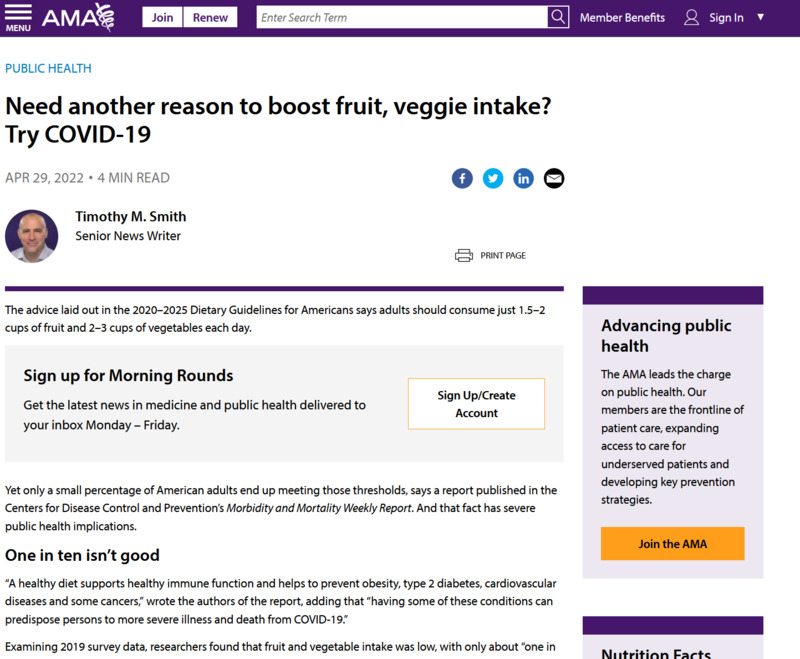 2022-04-29
2022-04-29Need another reason to boost fruit, veggie intake? Try COVID-19
This is a news story from the American Medical Association by Timothy M. Smith. Doctors mentioned in this article bring up the importance of diet and how it relates to fighting off COVID-19. According to a 2019 survey, researchers found only 1 in 10 adults meet the daily recommended intake of fruit and vegetables. There is a racial disparity as well. The researchers also noted that meeting vegetable intake recommendations was highest among those 51 or older. There were also differences in vegetable intake between groups defined by income level and race. While 12.2% of adults in the highest-income households got enough veggies, only 7.7% of those living in middle-income households did. Meanwhile, 6.9% of Black adults met vegetable intake recommendations, compared with 10.1% of white adults. Other barriers in getting the daily recommended intake have class issues, where some groups are more likely to have access to fresh food than other groups. “Perceived barriers to fruit and vegetable consumption include cost, as well as limited availability and access,” the report notes, adding that “for some persons, such barriers might have worsened during the COVID-19 pandemic related to economic and supply chain disruptions that could further limit ability to access healthier foods.” Dr. Kirley said she hopes the pandemic “will draw attention to this longstanding problem and that we’ll start to see more investment in innovative solutions to promote health through better nutrition.” With these things in mind, it demonstrates the barriers some people might have in fighting off COVID. -
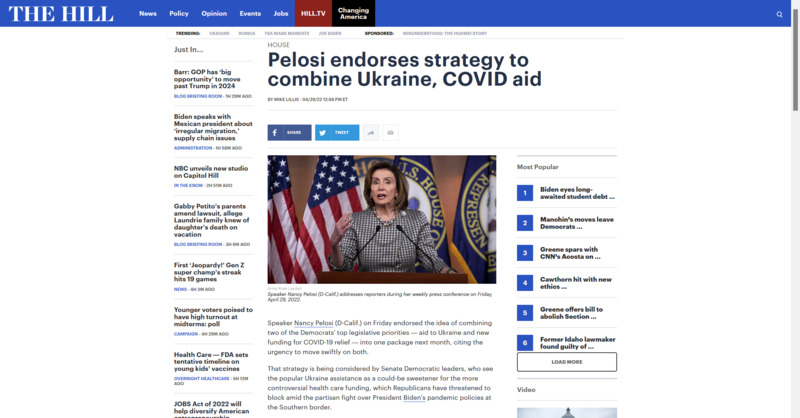 2022-04-29
2022-04-29Pelosi endorses strategy to combine Ukraine, COVID aid
This is a news story from The Hill by Mike Lillis. This is about House Speaker Nancy Pelosi combining COVID aid with Ukraine aid into one package. This strategy is intended to help Congress pass the spending needed for Ukraine for the war. Currently, the CDC has said that overall need for aid has diminished as cases keep going down, with more guidelines being removed. House Majority Leader Steny Hoyer (D-Md.) said the prospect that combining the two bills could delay them both is “a real consideration” that will likely influence the ultimate strategy. -
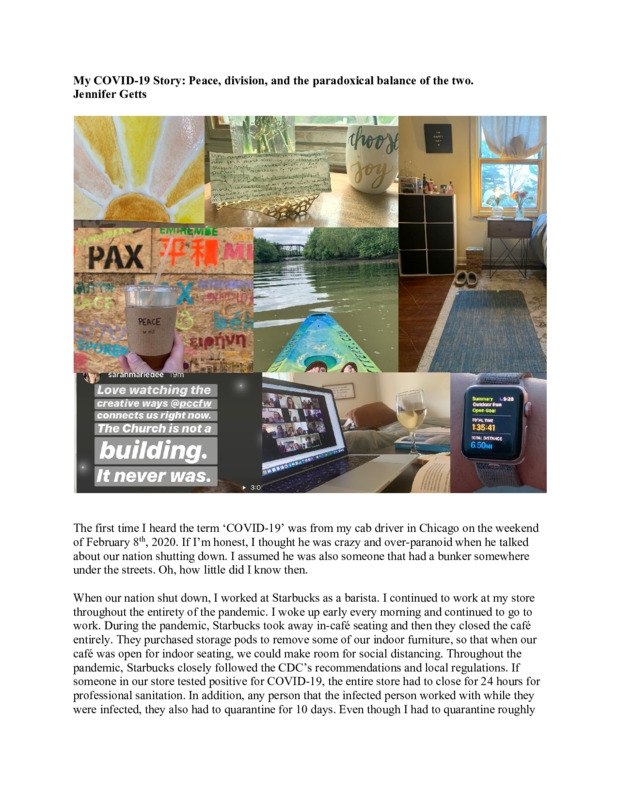 2022-04-29
2022-04-29My COVID-19 Story: Peace, division, and the paradoxical balance of the two.
The COVID-19 pandemic is largely associated with grief, pain, brokenness, division, and death. While that is true, it can also be associated with peace, quietness, solitude, growth, love, and birth. In my story, I try to strike the balance and prove that it is a paradoxical balance that can be weighed evenly.
